THE COURTS
Title 231—RULES OF
CIVIL PROCEDURE
PART II. ORPHANS' COURT RULES
[ 231 PA. CODE PART II ]
Order Rescinding and Replacing Rules 14.1—14.5 and Forms G-01—G-04 and Amending Rules 1.5, 5.10—5.12 and Index to Appendix of the Orphans' Court Rules; No. 770 Supreme Court Rules Doc.
[48 Pa.B. 3524]
[Saturday, June 16, 2018]
Order Per Curiam
And Now, this 1st day of June, 2018, upon the recommendation of the Orphans' Court Procedural Rules Committee; the proposal having been published for public comments at 47 Pa.B. 4815 (August 19, 2017) and 47 Pa.B. 5930 (September 23, 2017):
It is Ordered pursuant to Article V, Section 10 of the Constitution of Pennsylvania that:
1) Rules 14.1 through 14.5 and Orphans' Court Forms G-01 through G-04 of the Pennsylvania Orphans' Court Rules are rescinded and replaced; and
2) Rules 1.5, 5.10 through 5.12, and the Index to Appendix of the Pennsylvania Orphans' Court Rules are amended;
in the following form. This Order shall be processed in accordance with Pa.R.J.A. No. 103(b). Forms G-02 through G-05 shall be effective July 1, 2018 for all new report filings as of that date. The remainder of this Order shall be effective June 1, 2019.
(Editor's Note: See 48 Pa.B. 3582 (June 16, 2018) for a related Supreme Court Order.)
Annex A
TITLE 231. RULES OF CIVIL PROCEDURE
PART II. ORPHANS' COURT RULES
CHAPTER I. PRELIMINARY RULES Rule 1.5. Local Rules.
(a) All previously promulgated local rules are hereby vacated, effective September 1, 2016, except for those local rules promulgated under Chapter [14] XIV regarding guardianship of incapacitated persons, Chapter [15] XV regarding adoptions, and Chapter [16] XVI regarding proceedings pursuant to [section] Section 3206 of the Abortion Control Act.
(b) All previously promulgated local rules under Chapter XIV regarding guardianship of incapacitated persons are hereby vacated, effective June 1, 2019.
[(b)] (c) The requirements for the promulgation and amendment of local procedural rules for orphans' court proceedings are set forth in Pennsylvania Rule of Judicial Administration 103(d).
[(c)] (d) The local rules applicable to practice in the Civil or Trial Division of the local Court of Common Pleas shall not be applicable in the Orphans' Court Division unless so directed by these Rules or by local rule adopted by the court of the particular judicial district in accordance with Pa.R.J.A. No. [103] 103(d).
Note: Effective August 1, 2016, Pennsylvania Rule of Judicial Administration 103 was amended to consolidate and include all local rulemaking requirements. Accordingly, the rulemaking requirements under Pa. O.C. Rule 1.5 for the promulgation and amendment of local procedural rules for orphans' court proceedings were rescinded and replaced.
CHAPTER V. RULES GOVERNING SPECIFIC TYPES OF PETITIONS Rule 5.10. Public Sale of Real Property.
(a) In addition to the requirements provided by the Rules in Chapter III, a petition for the public sale of real property shall set forth the reason for filing the petition, a description, stating the size and location of the property to be sold, and the liens and charges to which it is subject.
(b) Public notice of the sale shall be given as required by law and as may be further required by local rule or as the court may order in a particular matter.
Note: Rule 5.10 is substantively identical to former Rule 12.9. If a person who has been adjudicated incapacitated possesses an interest in the subject real property, see also Rule 14.10.
Rule 5.11. Private Sale of Real Property or Options Therefor.
(a) Contents of Petition. In addition to the requirements provided by the Rules in Chapter III, a petition for the private sale or exchange of real property, or for the grant of an option for any such sale or exchange, shall set forth the following:
(1) the information required in a petition for the public sale of real property under Rule 5.10(a); and
(2) the name and address of the proposed purchaser and the terms of the proposed sale, exchange or option, the consideration therefor, and that this consideration is more than can be obtained at public sale.
(b) Exhibits. The petition shall be supported by the affidavits of at least two competent persons setting forth that they have inspected the real property to be sold, exchanged or optioned, that they are not personally interested in the proposed sale, exchange or option, that they are acquainted with the value of real estate in the area, that in their opinion the proposed consideration is more than can be obtained at public sale, and in the case of an exchange, that they are acquainted with the value of real estate in the locality of the property to be received.
Note: Rule 5.11 is substantively identical to former Rule 12.10. If a person who has been adjudicated incapacitated possesses an interest in the subject real property, see also Rule 14.10.
Rule 5.12. Mortgage or Lease of Real Property.
In addition to the requirements provided by the Rules in Chapter III, a petition to mortgage or lease real property shall set forth the following:
(a) the information required in a petition for the public sale of real property under Rule 5.10(a), as far as practicable; and
(b) the name of the proposed mortgagee or lessee and the terms of the proposed mortgage or lease.
Note: Rule 5.12 is substantively identical to former Rule 12.11. If a person who has been adjudicated incapacitated possesses an interest in the subject real property, see also Rule 14.10.
CHAPTER XIV. GUARDIANSHIPS OF INCAPACITATED PERSONS (Editor's Note: Rules 14.2—14.5 of the Orphans' Court Rules, which appear in 231 Pa. Code pages 14-1 and 14-2, serial pages (382157) and (382158), are reserved.)
Rules 14.2—14.5. (Reserved).
(Editor's Note: Rules 14.1—14.14 are added and printed in regular type to enhance readability.)
Rule 14.1. Guardianship Petition Practice and Pleading.
(a) Proceedings for Adjudication of Incapacity and Appointment of a Guardian. The following petition practice and pleading requirements set forth in Chapter III (Petition Practice and Pleading) shall be applicable to proceedings for the adjudication of incapacity and appointment of a guardian:
(1) Rule 3.2 (Headings; Captions);
(2) Rule 3.3 (Contents of All Petitions; General and Specific Averments);
(3) Rule 3.12 (Signing);
(4) Rule 3.13 (Verification); and
(5) Rule 3.14 (Amendment).
(b) Responsive Pleadings to a Petition for Adjudication of Incapacity and Appointment of a Guardian Filed Pursuant to Rule 14.2.
(1) Permitted responsive pleadings to a petition seeking the adjudication of incapacity and appointment of a guardian are limited to those identified in Rule 3.6 (Pleadings Allowed After Petition) and shall be subject to Rules 3.10 (Denials; Effect of Failure to Deny) and 3.11 (Answer with New Matter).
(2) The alleged incapacitated person and any person or institution served pursuant to Rule 14.2(f)(2) may file a responsive pleading.
(3) Any responsive pleading shall be filed with the clerk and served pursuant to Rule 4.3 (Service of Legal Paper Other than Citations or Notices) on all others entitled to file a responsive pleading pursuant to subparagraph (b)(2).
(4) All responsive pleadings shall be filed and served no later than five days prior to the hearing. The failure to file or timely file and serve a responsive pleading does not waive the right to raise an objection at the hearing.
(5) The court shall determine any objections at the adjudicatory hearing.
(c) All Other Petitions for Relief. Unless otherwise provided by Rule in this Chapter, the petition practice and pleading requirements set forth in Chapter III shall be applicable to any proceeding under these Rules other than a petition seeking the adjudication of incapacity and appointment of a guardian. ''Interested party'' as used in Chapter III shall include all those entitled to service pursuant to Rule 14.2(f).
(d) Intervention. A petition to intervene shall set forth the ground on which intervention is sought and a statement of the issue of law or question of fact the petitioner seeks to raise. The petitioner shall attach to the petition a copy of any pleading that the petitioner will file if permitted to intervene. A copy of the petition shall be served pursuant on all those entitled to service pursuant to Rule 14.2(f).
Explanatory Comment: This Rule is intended to specify the provisions and procedures of Chapter III that are applicable to proceedings under Chapter XIV. In proceedings for the adjudication of incapacity and appointment of a guardian, responsive pleadings are permitted as a means of identifying contested legal issues and questions of fact prior to the adjudicatory hearing. However, given the abbreviated time for filing a responsive pleading relative to other proceedings (Compare Pa. O.C. Rule 3.7(a)), the failure to file a responsive pleading should not operate to prelude an issue or objection from being raised and considered at the hearing. Such pleadings should not be filed as a means of delaying the hearing on the merits of the petition.
The practice for other petitions is to follow the requirements of Chapter III. Nothing in this Rule is intended to prevent relief being sought on an expedited basis, provided the petitioner or respondent is able to establish circumstances to the satisfaction of the court warranting disregard of procedural requirements. See Pa. O.C. Rule 1.2(a).
Rule 14.2. Petition for Adjudication of Incapacity and Appointment of a Guardian of the Person or Estate of an Incapacitated Person.
(a) Petition Contents. A petition to adjudicate an individual as an incapacitated person and appoint a guardian shall state in plain language:
(1) Name, age, address, and mailing address, if different, of the petitioner and the petitioner's relationship to the alleged incapacitated person;
(2) Name, date of birth, residence, and mailing address, if different, of the alleged incapacitated person;
(3) Names and addresses of the spouse, parents, and presumptive intestate heirs of the alleged incapacitated person and whether they are sui juris or non sui juris;
(4) Name and address of the person or institution providing residential services to the alleged incapacitated person;
(5) Names and addresses of other service providers and nature of services being provided;
(6) Whether there is an executed health care power of attorney or advance health care directive pursuant to Title 20, Chapter 54, and if so, the name and address of the person designated in the writing to act as the agent;
Note: See 20 Pa.C.S. §§ 5421 et seq. for health care power of attorney and advance health care directive (combination of a living will and health care power of attorney).
(7) Whether there is an executed power of attorney pursuant to Title 20, Chapter 56, and if so, the name and address of the person designated in the writing to act as the agent;
Note: See 20 Pa.C.S. §§ 5601 et seq. for power of attorney.
(8) Whether there is any other writing by the alleged incapacitated person pursuant to Title 20, Chapters 54 or 58 authorizing another to act on behalf of the alleged incapacitated person, and if so, the name and address of the person designated;
Note: See 20 Pa.C.S. §§ 5441—5447 for Living Will Act; 20 Pa.C.S. §§ 5451—5465 for Health Care Agents and Representatives Act; 20 Pa.C.S. §§ 5821—5826 for Advance Directive for Mental Health Act; 20 Pa.C.S. §§ 5831—5845 for Mental Health Care Agents Act.
(9) Reason(s) why guardianship is sought, including a description of functional limitations and the physical and mental condition of the alleged incapacitated person;
(10) If not plenary, then specific areas of incapacity over which it is requested that the guardian be assigned powers;
(11) The probability of whether the physical condition and mental condition of the alleged incapacitated person will improve;
(12) Whether there has been a prior incapacity hearing concerning the alleged incapacitated person, and if so, the name of the court, the date of the hearing, and the determination of capacity;
(13) Steps taken to find a less restrictive alternative than a guardianship;
(14) If a guardian of the estate is sought:
(i) the gross value of the estate and net income from all sources, to the extent known; and
(ii) whether there is a prepaid burial account, to the extent known;
(15) Whether the alleged incapacitated person is a veteran of the United States Armed Services, and whether the alleged incapacitated person is receiving benefits from the United States Veterans' Administration on behalf of himself or herself or through a spouse; and
(16) Name and address, if available, of any person that the petitioner proposes should receive notice of the filing of guardianship reports pursuant to Rule 14.8(b), which may include any person identified in paragraphs (a)(3)—(a)(8).
(b) Nomination of Guardian. The petition shall also include:
(1) The name, address, and mailing address, if different, of the proposed guardian whom the petitioner nominates to be appointed guardian and the nominee's relationship, if any, to the alleged incapacitated person. If the proposed guardian is an entity, then the name of the person or persons to have direct responsibility for the alleged incapacitated person and the name of the principal of the entity;
(2) Whether the proposed guardian has any adverse interest to the alleged incapacitated person;
(3) Whether the proposed guardian is available and able to visit or confer with the alleged incapacitated person;
(4) Whether the proposed guardian has completed any guardianship training, including the name of the training program, length of the training, and date of completion;
(5) Whether the proposed guardian has any guardianship certification, the current status of the certification, and any disciplinary action related to the certification;
(6) Whether the proposed guardian is or was a guardian in any other matters and, if so, the number of active matters; and
(7) If the petition nominates a different proposed guardian of the estate from the proposed guardian of the person, then the information required in subparagraphs (b)(1)—(b)(6) as to each nominee.
(c) Exhibits. The following exhibits shall be appended to the petition:
(1) All writings referenced in paragraphs (a)(6)—(a)(8), if available;
(2) The certified response to a Pennsylvania State Police criminal record check, with Social Security Number redacted, for each proposed guardian issued within six months of the filing of the petition;
(i) If any proposed guardian has resided outside the Commonwealth within the previous five-year period and was 18 years of age or older at any time during that period, then the petition shall include a criminal record check obtained from the statewide database, or its equivalent, in each state in which such proposed guardian has resided within the previous five-year period.
(ii) When any proposed guardian is an entity, the person or persons to have direct responsibility for the alleged incapacitated person and the principal of the entity shall comply with the requirements of subparagraph (c)(2).
Note: For information on requesting a criminal record check from the Pennsylvania State Police, see http://www.psp.pa.gov/Pages/Request-a-Criminal-History-Record.aspx.
(3) Any proposed orders as required by Rule 3.4(b); and
(4) Any consent or acknowledgement of a proposed guardian to serve.
(d) Emergency Guardian. A petition seeking the appointment of an emergency guardian shall aver with specificity the facts giving rise to the emergent circumstances and why the failure to make such an appointment will result in irreparable harm to the person or estate of the alleged incapacitated person.
Note: Limitations on emergency guardianships are prescribed by statute. See 20 Pa.C.S. § 5513.
(e) Separate Petitions. Separate petitions shall be filed for each alleged incapacitated person.
(f) Citation with Notice. A citation with notice using the form provided in the Appendix to these Rules shall be attached to and served with the petition and any preliminary order as follows:
(1) By personal service upon the alleged incapacitated person no less than 20 days prior to the hearing. Additionally, the content and terms of the petition shall be explained to the maximum extent possible in language and terms the alleged incapacitated person is most likely to understand.
(2) In a manner permitted by Rule 4.3 no less than 20 days prior to the hearing upon:
(i) All persons sui juris who would be entitled to an intestate share in the estate of the alleged incapacitated person;
(ii) The person or institution providing residential services to the alleged incapacitated person;
(iii) Any person named in paragraphs (a)(6)—(a)(8); and
(iv) Such other entities and persons as the court may direct, including service providers.
Note: For notice to the United States Veterans' Bureau, see 20 Pa.C.S. § 8411.
(3) For a petition seeking the appointment of an emergency guardian, the court may direct the manner of service as emergent circumstances warrant. Thereafter, notice shall be served in accordance with Rule 14.2(f)(2).
Explanatory Comment: Concerning the requirement of a criminal record check set forth in paragraph (c)(2), the Pennsylvania State Police has created the Pennsylvania Access to Criminal History (''PATCH'') System to enable the public to obtain criminal history record checks via Internet request. The certified response from the Pennsylvania State Police criminal history record check need not be notarized to comply with the requirements of this rule. Any response other than ''no record'' may require supplementation at the discretion of the court.
Rule 14.3. Alternative Proof of Incapacity: Expert Report in Lieu of In-Person or Deposition Testimony of Expert.
(a) A petitioner may seek to offer into evidence an expert report for the determination of incapacity in lieu of testimony, in-person or by deposition, of an expert using the form provided in the Appendix to these rules. In an emergency guardianship proceeding, an expert report may be offered into evidence if specifically authorized by the court.
(b) Notice.
(1) If a petitioner seeks to offer an expert report permitted under paragraph (a), the petitioner shall serve a copy of the completed report upon the alleged incapacitated person's counsel and all other counsel of record pursuant to Rule 4.3 or, if unrepresented, upon the alleged incapacitated person, pursuant to Pa.R.C.P. No. 402(a) by a competent adult no later than ten days prior to the hearing on the petition.
(2) If a petitioner seeks to offer an expert report, as permitted under paragraph (a), the petitioner shall serve pursuant to Rule 4.3 a notice of that fact upon those entitled to notice of the petition and hearing no later than ten days prior to the hearing on the petition.
(3) The petitioner shall file a certificate of service with the court as to paragraphs (b)(1) and (b)(2).
(c) Demand.
(1) Within five days of service of the completed report provided in paragraph (b)(1), the alleged incapacitated person's counsel or, if unrepresented, the alleged incapacitated person, may file with the court and serve upon the petitioner pursuant to Rule 4.3 a demand for the testimony of the expert.
(2) If a demand for testimony is filed and served as provided herein, then the expert report may not be admitted and an expert must provide testimony at the hearing, whether in-person or by deposition.
(d) Unless otherwise demanded pursuant to paragraph (c)(2), in the sole discretion of the court, incapacity may be established through the admission of an expert report prepared in compliance with the form provided in the Appendix to these rules. The expert must be qualified by training and experience in evaluating individuals with incapacities of the type alleged in the petition. The expert must sign, date, and verify the completed expert report.
(e) In the interest of justice, the court may excuse the notice and demand requirements set forth in paragraphs (b) and (c).
Explanatory Comment: This Rule is intended to permit the alleged incapacitated person to exercise the right to cross-examine testimony as to the capacity of the alleged incapacitated person. See 20 Pa.C.S. § 5518.1. Permitting the use of an expert report in compliance with this Rule replaces the requirement of testimony, in-person or by deposition, of an expert. See 20 Pa.C.S. § 5518. ''Deposition,'' as used in this Rule is intended to be a deposition conducted in accordance with the Pennsylvania Rules of Civil Procedure. The Rule is permissive; whether an expert report is admitted in lieu of testimony is in the sole discretion of the court. Nothing in this Rule is intended to preclude the court from requiring testimony from the expert or otherwise requiring supplementation.
Rule 14.4. Counsel.
(a) Retention of Counsel. If counsel for the alleged incapacitated person has not been retained, the petitioner shall notify the court in writing at least seven days prior to the adjudicatory hearing that the alleged incapacitated person is unrepresented and also indicate whether the alleged incapacitated person has requested counsel.
(b) Private Counsel. If the alleged incapacitated person has retained private counsel, counsel shall prepare a comprehensive engagement letter for the alleged incapacitated person to sign, setting forth when and how counsel was retained, the scope of counsel's services, whether those services include pursuing any appeal, if necessary, how counsel will bill for legal services and costs and the hourly rate, if applicable, who will be the party considered responsible for payment, whether any retainer is required, and if so, the amount of the retainer. Counsel shall provide a copy of the signed engagement letter to the court upon request.
(c) Appointed Counsel. The court may appoint counsel if deemed appropriate in the particular case. Any such order appointing counsel shall delineate the scope of counsel's services and whether those services include pursuing any appeal, if necessary.
(d) Other Counsel. Counsel for any other party shall enter an appearance in accordance with Rule 1.7(a).
Explanatory Comment: Reasonable counsel fees, when appropriate, should be paid from the estate of the alleged incapacitated person whenever possible. If the alleged incapacitated person is unable to pay for counsel, then the court may order counsel fees and costs to be paid by the county. See 20 Pa.C.S. § 5511(c). Any fee dispute should be resolved in a timely and efficient manner to preserve resources in order to maintain the best possible quality of life for the incapacitated person.
Rule 14.5. Waiver or Modification of Bond.
(a) Request. A request for the court to waive or modify a bond requirement for a guardian of the estate may be raised within the petition for adjudication of incapacity or at any other time by petition.
(b) Waiver or Modification. The court may order the waiver or modification of a bond requirement for good cause.
(c) Assurance. If the court waives or modifies a bond requirement, then the court shall consider the necessity and means of periodic demonstration of continued good cause.
Explanatory Comment: Pursuant to 20 Pa.C.S. § 5515, the provisions of Sections 5121—5123 of Title 20 relating to bonding requirements are incorporated by reference into Chapter 55 proceedings. When property is held by the incapacitated person as fiduciary, see 20 Pa.C.S. § 5516. ''Good cause'' may include, but is not limited to, an estate of nominal value, fluctuation in the size of the estate, adequate insurance maintained by the guardian against risk of loss to the estate, the creditworthiness of the guardian, and assets of the guardian relative to the value of the estate.
Rule 14.6. Determination of Incapacity and Selection of Guardian.
(a) Determination of Incapacity. The procedure for determining incapacity and for appointment of a guardian shall meet all requirements set forth at 20 Pa.C.S. §§ 5511, 5512, and 5512.1. In addition, the petitioner shall present the citation and proof of service at the hearing.
Note: See In re Peery, 727 A.2d 539 (Pa. 1999) (holding a person does not require a guardian if there is no need for guardianship services).
(b) Selection of Guardian. If guardianship services are needed, then the court shall appoint the person nominated as such in a power of attorney, a health care power of attorney, an advance health care directive, a mental health care declaration, or mental health power of attorney, except for good cause shown or disqualification. Otherwise, the court shall consider the eligibility of one or more persons to serve as guardian in the following order:
(1) Guardian of the Person:
(i) The guardian of the estate;
(ii) The spouse, unless estranged or an action for divorce is pending;
(iii) An adult child;
(iv) A parent;
(v) The nominee of a deceased or living parent of an unmarried alleged incapacitated person;
(vi) An adult sibling;
(vii) An adult grandchild;
(viii) Other adult family member;
(ix) An adult who has knowledge of the alleged incapacitated person's preferences and values, including, but not limited to religious and moral beliefs, and would be able to assess how the alleged incapacitated person would make decisions; or
(x) Other qualified proposed guardian, including a professional guardian.
(2) Guardian of the Estate. When the estate of the incapacitated person consists of minimal assets or where the proposed guardian possesses the skills and experience necessary to manage the finances of the estate:
(i) The guardian of the person;
(ii) The spouse unless estranged or an action for divorce is pending;
(iii) An adult child;
(iv) A parent;
(v) The nominee of a deceased or living parent of an unmarried alleged incapacitated person;
(vi) An adult sibling;
(vii) An adult grandchild;
(viii) Other adult family member; or
(ix) An adult who has knowledge of the alleged incapacitated person's preferences and values, including, but not limited to religious and moral beliefs, and would be able to assess how the alleged incapacitated person would make decisions.
Where no individual listed in subparagraphs (i)—(ix) of paragraph (b)(2) possesses the skills and experience necessary to manage the finances of the estate, the guardian of the estate may be any qualified proposed guardian, including a professional guardian or corporate fiduciary.
Explanatory Comment: If a principal nominates a guardian pursuant to a power of attorney, a health care power of attorney, an advance health care directive, which is a combination of a living will and a health care power of attorney, a mental health care declaration, or mental health power of attorney, then court must appoint that person as guardian except for good cause or disqualification. See 20 Pa.C.S. § 5604(c)(2) (power of attorney); 20 Pa.C.S. § 5460(b) (health care power of attorney); 20 Pa.C.S. § 5422 (defining ''advance health care directive''); 20 Pa.C.S. § 5823 (mental health declaration); 20 Pa.C.S. § 5841(c) (mental health power of attorney); see also 20 Pa.C.S. § 5511(f) (who may be appointed guardian).
Rule 14.7. Order and Certificate.
(a) Order Adjudicating Incapacity and Appointing Guardian.
(1) An order adjudicating incapacity and appointing a guardian shall address:
(i) the type of guardianship being ordered and any limits, if applicable;
(ii) the continued effectiveness of any previously executed powers of attorney or health care powers of attorney and the authority of such agent to act under the document;
(iii) the necessity of filing reports pursuant to Rule 14.8(a); and
(iv) the person or persons entitled to receive notice of the filing of such reports, pursuant to Rule 14.8(b).
(2) An order adjudicating incapacity and appointing a guardian shall contain a provision substantially in the following form:
[Incapacitated person] is hereby notified of the right to seek reconsideration of this Order pursuant to Rule 8.2 and the right to appeal this Order within 30 days from the date of this Order by filing a Notice of Appeal with the Clerk of the Orphans' Court. [Incapacitated person] may also petition the court at any time to review, modify, or terminate the guardianship due to a change in circumstances. [Incapacitated person] has a right to be represented by an attorney to file a motion for reconsideration, an appeal, or to seek modification or termination of this guardianship. If the assistance of counsel is needed and [incapacitated person] cannot afford an attorney, an attorney will be appointed to represent [incapacitated person] free of charge.(b) Order Adjudicating Incapacity and Appointing Guardian of Estate.
(1) In addition to the requirements set forth in paragraph (a)(1), an order adjudicating incapacity and appointing a guardian of the estate shall address:
(i) whether a bond is required and when the bond is to be filed; and
(ii) whether the guardian can spend principal without prior court approval.
(2) In addition to the requirement set forth in paragraph (a)(2), an order adjudicating incapacity and appointing a guardian of the estate shall contain a provision substantially in the following form:
All financial institutions, including without limitation, banks, savings and loans, credit unions, and brokerages, shall grant to the guardian of [incapacitated person]'s estate access to any and all assets, records, and accounts maintained for the benefit of [incapacitated person], and the guardian of [incapacitated person]'s estate shall be entitled to transfer, retitle, withdraw, or otherwise exercise dominion and control over any and all said assets, records, and accounts. The failure of any financial institution to honor this order may lead to contempt proceedings and the imposition of sanctions.(c) Certificate of Guardianship of Estate. Upon the request of the guardian of the estate, the clerk shall issue a certificate substantially in the following form:
(Caption) I CERTIFY that on ______ , after giving full consideration to the factors set forth in Chapter 55 of the Probate, Estates, and Fiduciaries Code, 20 Pa.C.S. §§ 5501 et seq., in the above-captioned matter, the Court adjudged ______ an incapacitated person and appointed ______ as plenary guardian of the estate.
FURTHER, I CERTIFY the Court, inter alia, ordered that:
All financial institutions, including without limitation, banks, savings and loans, credit unions, and brokerages shall grant to the guardian of [incapacitated person]'s estate access to any and all assets, records, and accounts maintained for the benefit of [incapacitated person], and the guardian of [incapacitated person]'s estate shall be entitled to transfer, retitle, withdraw, or otherwise exercise dominion and control over any and all said assets, records, and accounts. The failure of any financial institution to honor this order may lead to contempt proceedings and the imposition of sanctions.
Witness my hand and seal of said Court
this __ day of _____ , __ .[seal]
CLERK OF ORPHANS' COURT
_________________Explanatory Comment: The requirements of paragraph (a) are intended to apply to all guardianship orders. The items addressed and contained in the order, as set forth in paragraphs (a) and (b), are not exhaustive. The court may fashion a guardianship of a person order to inform health care providers of the guardian's authority, including the authority to give informed consent to proposed treatment, to share information, and to make decisions for the incapacitated person. See also In re DLH, 2 A.3d 505 (Pa. 2010) (discussing whether guardian has authority concerning life-preserving care); 20 Pa.C.S. § 5460(a) (requiring the court to determine the extent of agent's authority under a health care power of attorney); 20 Pa.C.S. § 5604(c)(3) (requiring the court to determine the extent of agent's authority under a durable power of attorney).
Rule 14.8. Guardianship Reporting, Monitoring, Review, and Compliance.
(a) Reporting. A guardian shall file the following reports with the clerk:
(1) An inventory by the guardian of the estate within 90 days of such guardian's appointment;
(2) An annual report by the guardian of the estate of an incapacitated person one year after appointment and annually thereafter;
(3) An annual report by the guardian of the person one year after appointment and annually thereafter;
(4) A final report by the guardian of the person and the guardian of the estate within 60 days of the death of the incapacitated person, an adjudication of capacity, a change of guardian, or the expiration of an order of limited duration; and
(5) A final report from the guardian of the person and the guardian of the estate upon receipt of the provisional order from another state's court accepting transfer of a guardianship.
(b) Notice of Filing. If, pursuant to Rule 14.7(a)(1)(iv), the order appointing the guardian identifies the person or persons entitled to receive notice of the filing of any report set forth in paragraph (a), the guardian shall serve a notice of filing within ten days after filing a report using the form provided in the Appendix to these Rules. Service shall be in accordance with Rule 4.3.
(c) Design of Forms. The Court Administrator of Pennsylvania, in consultation with the Orphans' Court Procedural Rules Committee and the Advisory Council on Elder Justice in the Courts, shall design and publish forms necessary for the reporting requirements set forth in paragraph (a).
(d) Monitoring. The clerk or the court's designee shall monitor the guardianship docket to confirm the guardian's compliance with the reporting requirements set forth in paragraph (a).
(e) Review. The court or its designee shall review the filed reports.
(f) Compliance. To ensure compliance with these reporting requirements:
(1) If any report is deemed incomplete or is more than 20 days delinquent, then the clerk or the court's designee shall serve notice on the guardian directing compliance within 20 days, with a copy of the notice sent to the court and the guardian's counsel, if represented.
(2) If the guardian fails to comply with the reporting requirements within 20 days of service of the notice, then the clerk or the court's designee shall file and transmit a notice of deficiency to the adjudicating judge and serve a notice of deficiency on those persons named in the court's order pursuant to Rule 14.7(a)(1)(iv) as being entitled to receive a notice of filing.
(3) The court may thereafter take such enforcement procedures as are necessary to ensure compliance.
Explanatory Comment: The reporting forms are available at http://www.pacourts.us/forms/for-the-public/orphans-court-forms. This Rule is silent as to the manner of proceeding when reports are deficient or warrant further investigation, or when the guardian is recalcitrant after being given notice by the clerk or the court's designee. In its discretion, the court may order further documentation, conduct a review hearing, or take further action as may be deemed necessary, including, but not limited to, removal of the guardian or contempt proceedings.
Rule 14.9. Review Hearing.
(a) Initiation. A review hearing may be requested by petition or ordered by the court.
(b) Petition. A petition for a review hearing shall set forth:
(1) the name, age, address, and mailing address, if different, of the petitioner and the petitioner's relationship to the incapacitated person;
(2) the date of the adjudication of incapacity;
(3) the names and addresses of all guardians;
(4) if the incapacitated person has been a patient in a mental health facility, the name of such facility, the date of admission, and the date of discharge;
(5) the present address of the incapacitated person, and the name of the person with whom the incapacitated person is living;
(6) the names and addresses of the presumptive intestate heirs of the incapacitated person and whether they are sui juris or non sui juris; and
(7) an averment that:
(i) there has been significant change in the incapacitated person's capacity and the nature of that change;
(ii) there has been a change in the need for guardianship services and the nature of that change; or
(iii) the guardian has failed to perform duties in accordance with the law or act in the best interest of the incapacitated person, and details as to the duties that the guardian has failed to perform or has performed but are allegedly not in the best interests of the incapacitated person.
(c) Service. The petition shall be served in accordance with Rule 4.3 upon the incapacitated person and those entitled to notice pursuant to Rule 14.2(f)(2).
(d) Hearing. The review hearing shall be conducted promptly after the filing of the petition with notice of the hearing served upon those served with the petition pursuant to paragraph (c).
Explanatory Comment: Nothing in this Rule is intended to preclude the court from scheduling a review hearing upon its own initiative or in the order adjudicating incapacity and appointing a guardian. For the court's disposition of a petition for a review hearing and evidentiary burden of proof, see 20 Pa.C.S. § 5512.2.
Rule 14.10. Proceedings Relating to Real Property.
(a) Applicable Rules. A petition for the public or private sale, exchange, lease, or mortgage of real property of an incapacitated person or the grant of an option for the sale, exchange, or lease of the same shall conform as far as practicable to the requirements of these Rules for personal representatives, trustees, and guardians of minors in a transaction of similar type.
(b) Objection. The guardian shall include in the petition an averment as to whether the guardian knows or has reason to know of any objection of the incapacitated person to the proposed transaction, the nature and circumstances of any such objection, and whether expressed before or after the adjudication of incapacity.
Note: See Pa. O.C. Rules 5.10, 5.11, and 5.12.
Rule 14.11. Transfer of Guardianship of the Person to Another State.
(a) Petition. A petition filed by a guardian appointed in Pennsylvania to transfer the guardianship of the person to another state must plead sufficient facts to demonstrate:
(1) the incapacitated person is physically present in or is reasonably expected to move permanently to the other state;
(2) plans for care and services for the incapacitated person in the other state are reasonable and sufficient;
(3) the court to which the guardianship will be transferred; and
(4) the guardianship will likely be accepted by the other state's court.
(b) Service. The guardian shall serve a copy of the petition in accordance with Rule 4.3 upon the incapacitated person and those entitled to service pursuant to Rule 14.2(f)(2).
(c) Objections. Any person entitled to service of the petition may file an answer with the clerk raising objections alleging that the transfer would be contrary to the interests of the incapacitated person.
(d) Hearing. If needed, the court shall conduct an evidentiary hearing on the petition.
(e) Orders. Upon finding that the allegations contained in the petition have been substantiated and the objections, if any, have not been substantiated, the court shall:
(1) issue an order provisionally granting the petition to transfer the guardianship and directing the guardian to petition for acceptance of the guardianship in the other state; and
(2) issue a final order confirming the transfer and relinquishing jurisdiction upon receipt of the provisional order from the other state's court accepting the transfer and the filing of the final report of the guardian.
Explanatory Comment: See Subchapter C of the Uniform Adult Guardianship and Protective Proceedings Jurisdiction Act, 20 Pa.C.S. §§ 5921—5922. This petition may also include a request to transfer the guardianship of the estate to another state as provided in Rule 14.12. The likelihood that the guardianship may be accepted by the other state's court may be established by evidence of the state having procedures similar to Rule 14.13.
Rule 14.12. Transfer of Guardianship of the Estate to Another State.
(a) Petition. A petition filed by a guardian appointed in Pennsylvania to transfer the guardianship of the estate must plead sufficient facts to demonstrate:
(1) the incapacitated person is:
(i) physically present in the other state;
(ii) reasonably expected to move permanently to the other state; or
(iii) significantly connected to the other state.
(2) adequate arrangements will be made for the management of the incapacitated person's estate;
(3) the court to which the guardianship will be transferred; and
(4) the guardianship will likely be accepted by the other state's court.
(b) Service. The guardian shall serve a copy of the petition in accordance with Rule 4.3 upon the incapacitated person and those entitled to service pursuant to Rule 14.2(f)(2).
(c) Objections. Any person entitled to service of the petition may file an answer with the clerk raising objections alleging that the transfer would be contrary to the interests of the incapacitated person.
(d) Hearing. If needed, the court shall conduct an evidentiary hearing on the petition.
(e) Orders. Upon finding that the allegations contained in the petition have been substantiated and the objections, if any, have not been substantiated, the court shall:
(1) issue an order provisionally granting the petition to transfer the guardianship and directing the guardian to petition for acceptance of the guardianship in the other state; and
(2) issue a final order confirming the transfer and relinquishing jurisdiction upon receipt of the provisional order from the other state's court accepting the transfer and the filing of the final report of the guardian.
Explanatory Comment: See Subchapter C of the Uniform Adult Guardianship and Protective Proceedings Jurisdiction Act, 20 Pa.C.S. §§ 5921—5922. For factors used to determine the significance of the incapacitated person's connection with the other state, see 20 Pa.C.S. § 5911(b). This petition may also include a request to transfer the guardianship of the person to another state as provided in Rule 14.11. The likelihood that the guardianship may be accepted by the other state's court may be established by evidence of the state having procedures similar to Rule 14.13.
Rule 14.13. Acceptance of a Guardianship Transferred from Another State.
(a) A petition to confirm the transfer of a guardianship from another state to Pennsylvania shall:
(1) plead sufficient facts to demonstrate:
(i) the eligibility of the guardian for appointment in Pennsylvania;
(ii) the proceeding in the other state approving the transfer was conducted in a manner similar to Rules 14.11 or 14.12 (concerning transfer of guardianship);
(1) include a certified copy of the other state's provisional order approving the transfer; and
(2) include a certified copy of the petition and order determining initial incapacity in the other state.
(b) Service. The guardian shall serve a copy of the petition in the manner and upon the incapacitated person and those entitled to service pursuant to Rule 14.2(f).
(c) Objections. Any person entitled to notice of the petition may file an answer with the clerk raising objections alleging that the transfer would be contrary to the interests of the incapacitated person.
(d) Hearing. If needed, the court shall conduct an evidentiary hearing on the petition.
(e) Orders. Upon finding that the allegations contained in the petition have been substantiated and the objections, if any, have not been substantiated, the court shall:
(1) issue an order provisionally granting the petition to confirm transfer of the guardianship; and
(2) upon receiving a final order from the court transferring the guardianship, the court shall issue a final order accepting the guardianship, appointing the guardian appointed previously by the court of the other state as the guardian in Pennsylvania, and directing the guardian to comply with the reporting requirements of Rule 14.8.
Explanatory Comment: See Uniform Adult Guardianship and Protective Proceedings Jurisdiction Act, 20 Pa.C.S. § 5922(f) (court's consideration of a modification of guardianship).
Rule 14.14. Forms.
The following forms located in the Appendix shall be used exclusively:
(a) Important Notice—Citation with Notice (G-01);
(b) Report of Guardian of the Estate (G-02);
(c) Report of Guardian of the Person (G-03);
(d) Guardian's Inventory for a Minor (G-04);
(e) Guardian's Inventory for an Incapacitated Person (G-05);
(f) Guardianship of Incapacitated Person: Petition for Adjudication/Statement of Proposed Distribution Pursuant to Pa. O.C. Rule 2.4 (OC-03);
(g) Guardianship of Minor: Petition for Adjudication/Statement of Proposed Distribution Pursuant to Pa. O.C. Rule 2.4 (OC-04);
(h) Expert Report (G-06); and
(i) Notice of Filing (G-07).
Explanatory Comment: In accordance with Rule 1.8, these forms must be used exclusively and cannot be replaced or supplanted by a local form.
INDEX TO APPENDIX
ORPHANS' COURT AND REGISTER OF WILLS FORMS
ADOPTED BY SUPREME COURT
PURSUANT TO Pa. O.C. Rule 1.8
Available as Fill-in Forms on Website of Administrative Office of Pennsylvania Courts
[http://www.pacourts.us/Forms/OrphansCourtForms.htm]
http://www.pacourts.us/forms/for-the-public/orphans-court-forms
Orphans' Court and Administration Forms * * * * * B. Guardianship Forms
1. Important Notice—Citation with Notice (Pa. O.C. Rule [14.5] 14.2)
G-012. [Annual Report—Guardian of Estate] Report of Guardian of the Estate
G-023. [Annual Report—Guardian of Person] Report of Guardian of the Person
G-034. Guardian's Inventory for a Minor
G-045. Guardian's Inventory for an Incapacitated Person
G-05[5.] 6. Guardianship of Incapacitated Person: Petition for Adjudication/Statement of Proposed Distribution Pursuant to Pa. O.C. Rule 2.4
OC-03*[6.] 7. Guardianship of Minor: Petition for Adjudication/Statement of Proposed Distribution Pursuant to Pa. O.C. Rule 2.4
OC-04**8. Expert Report
G-069. Notice of Filing
G-07*Form OC-3 is not reprinted here and is located under Audit and Administration Forms at No. 3.
**Form OC-4 is not reprinted here and is located under Audit and Administration Forms at No. 4.
* * * * *
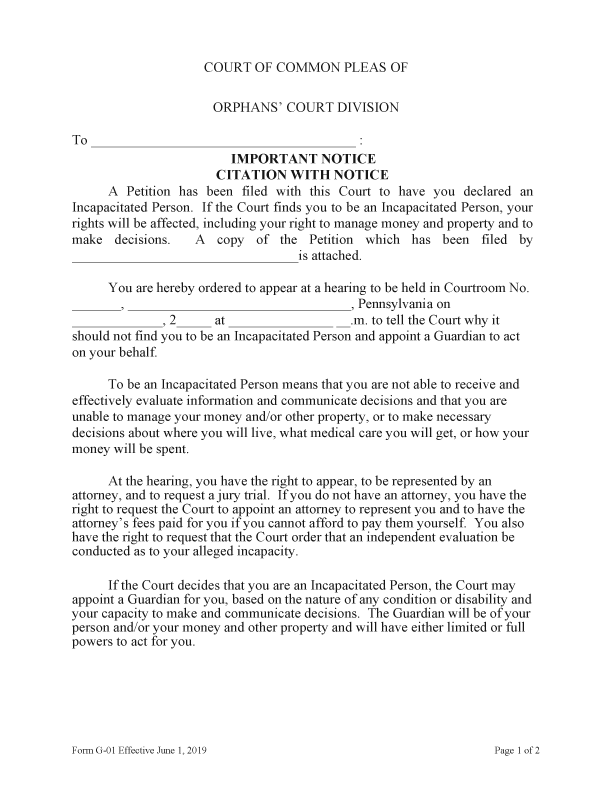
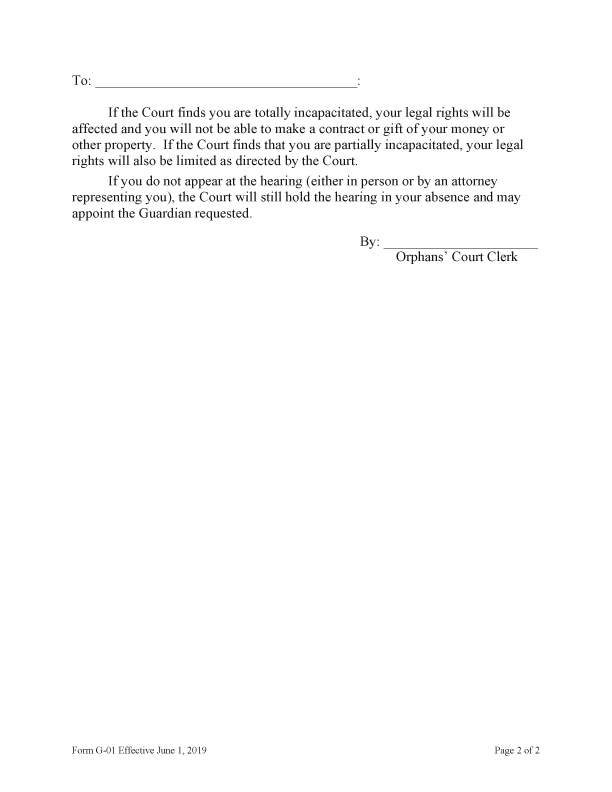
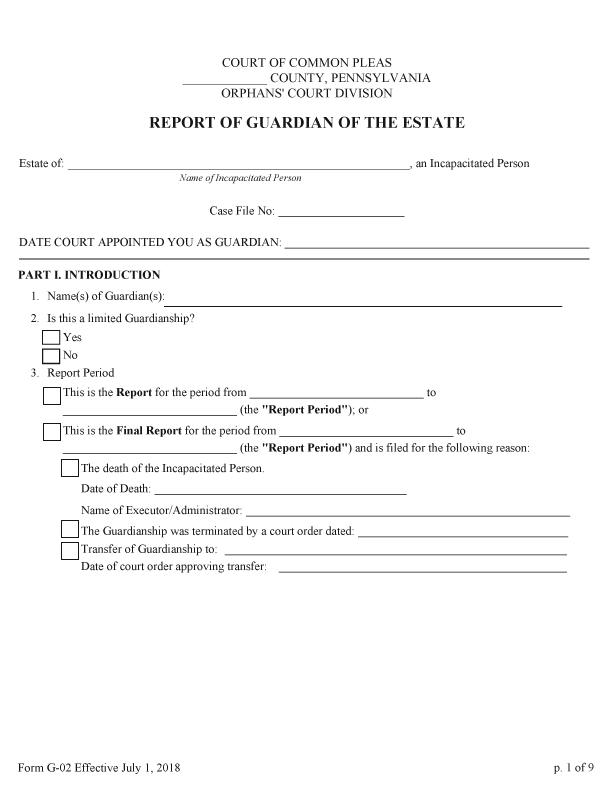
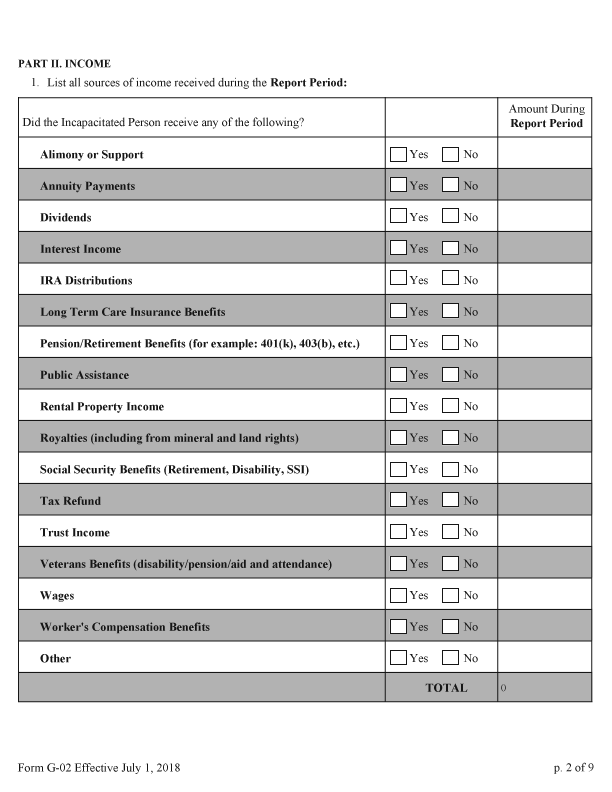
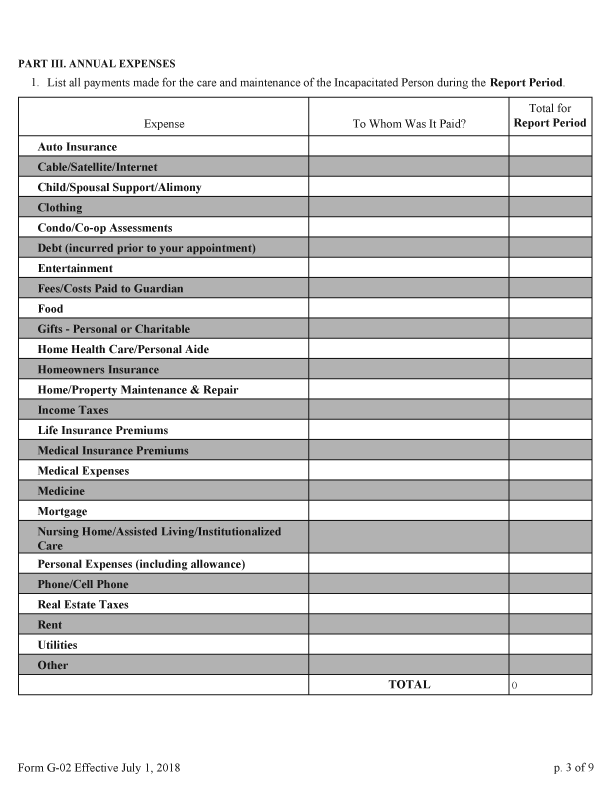
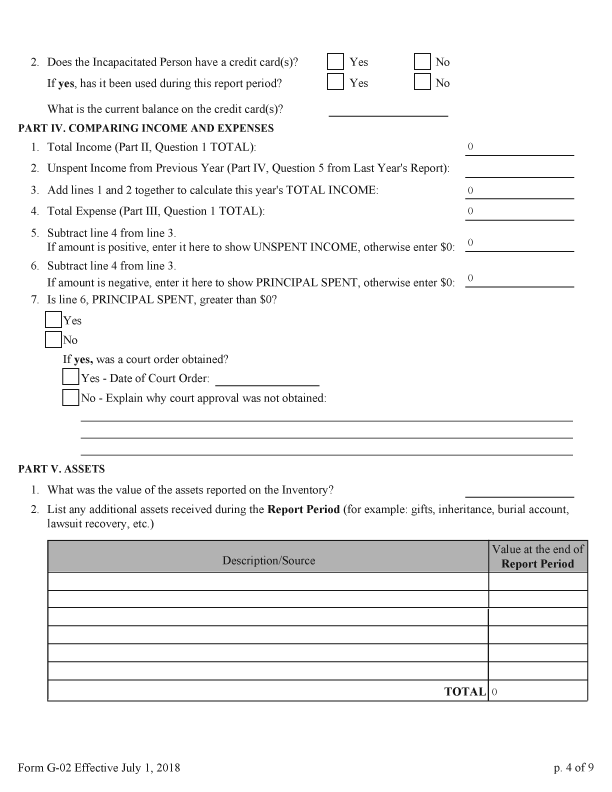
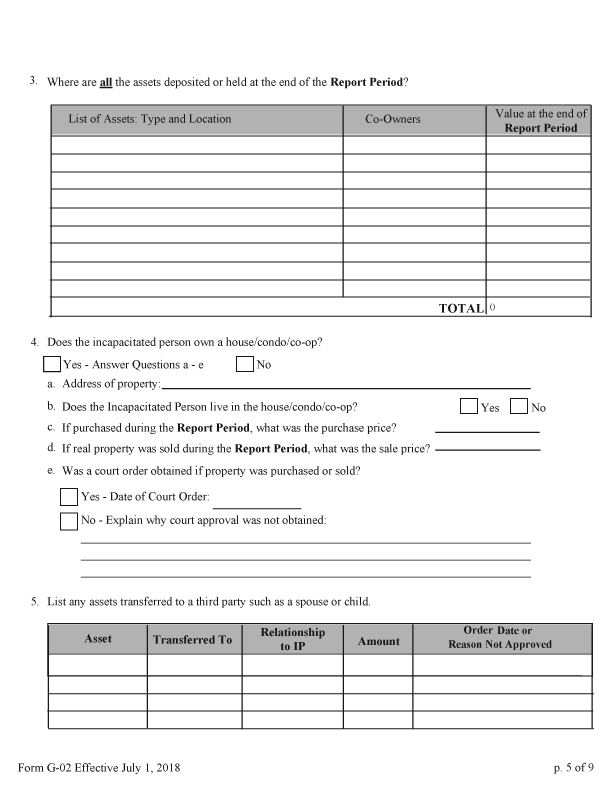
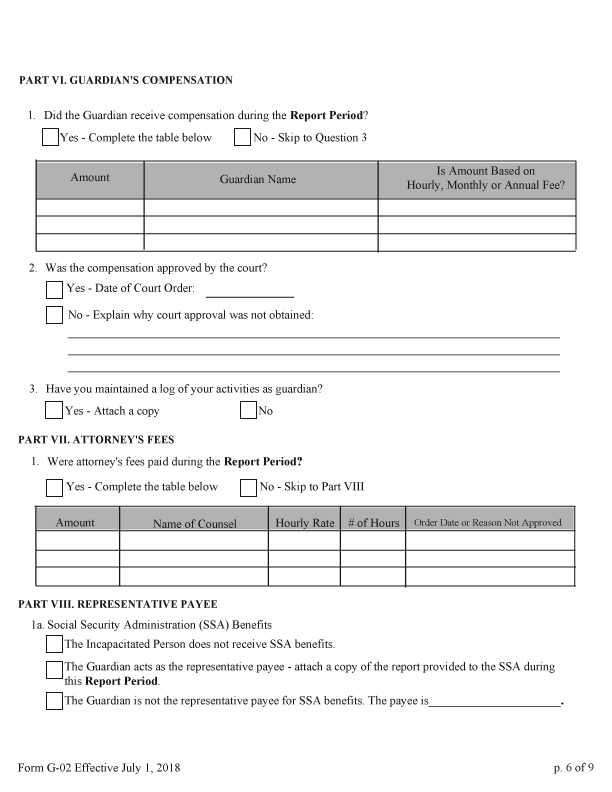
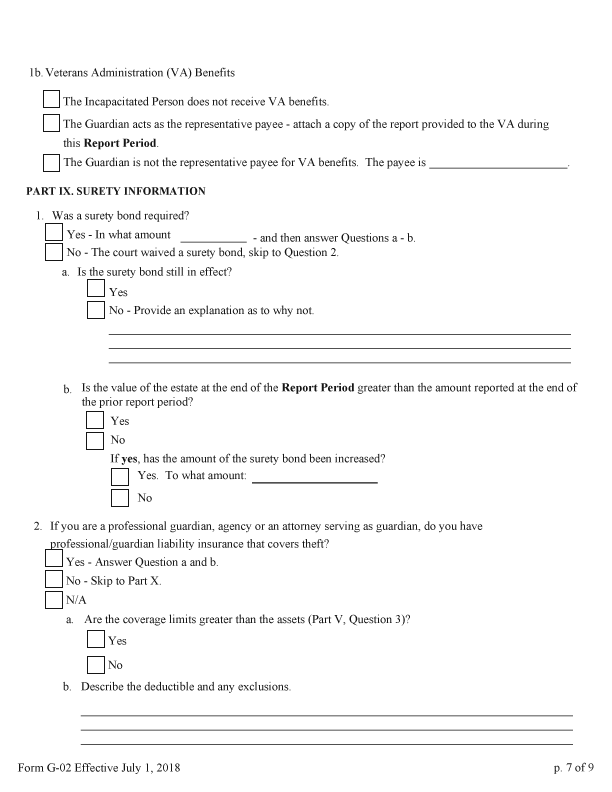
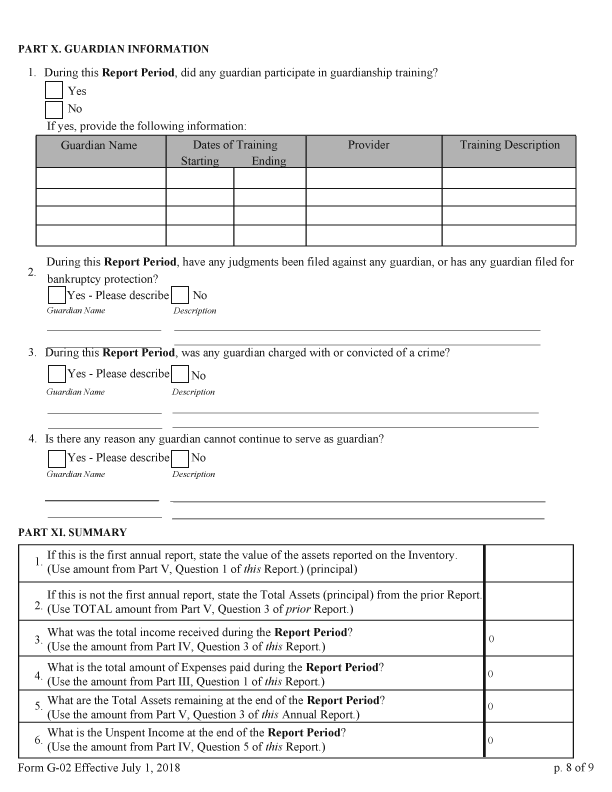
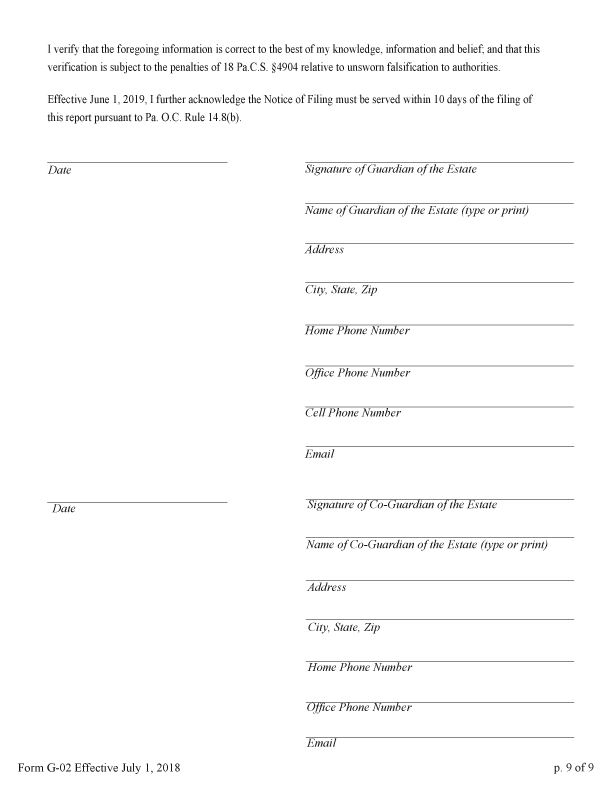
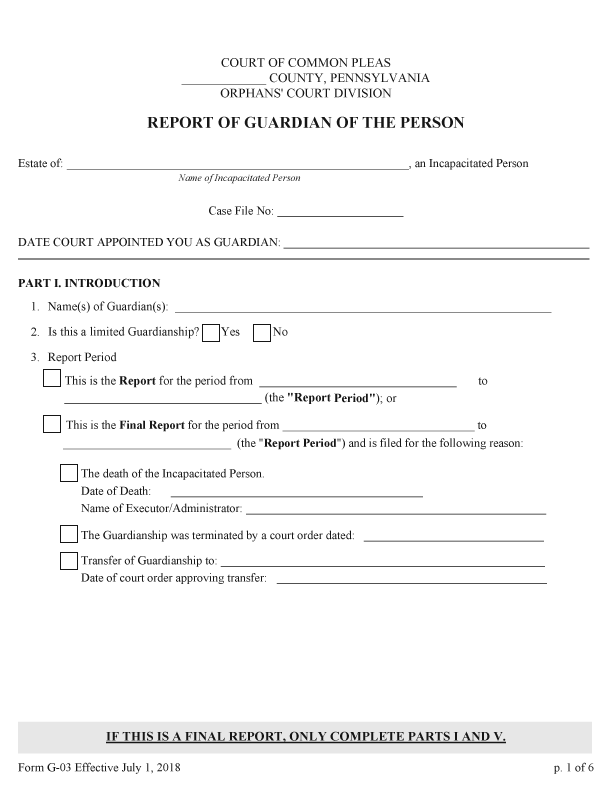
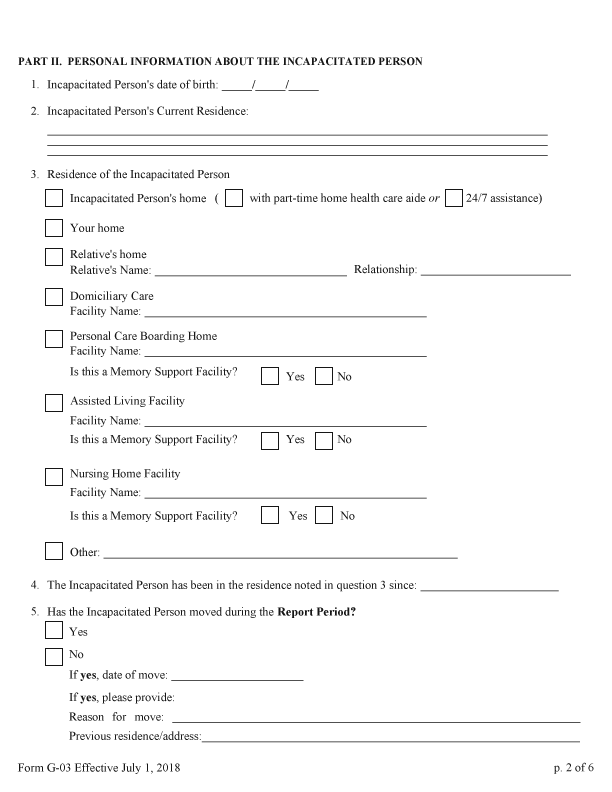
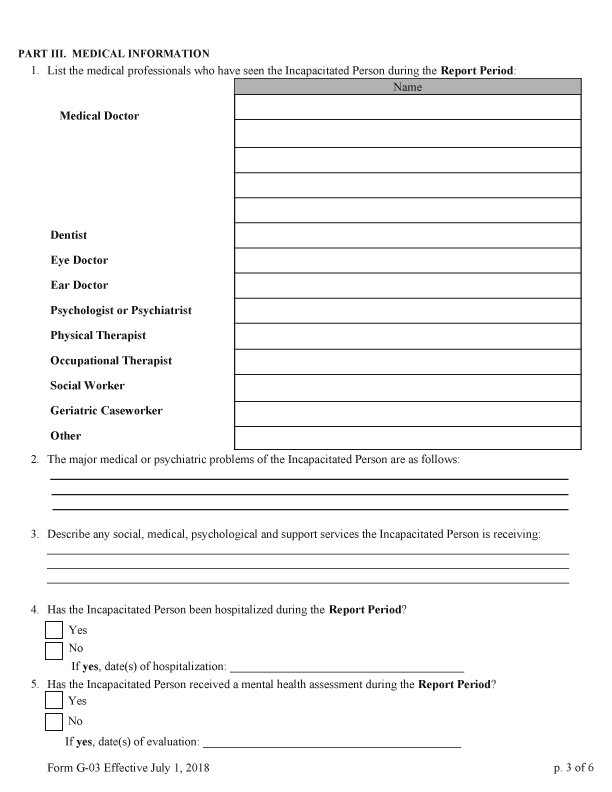
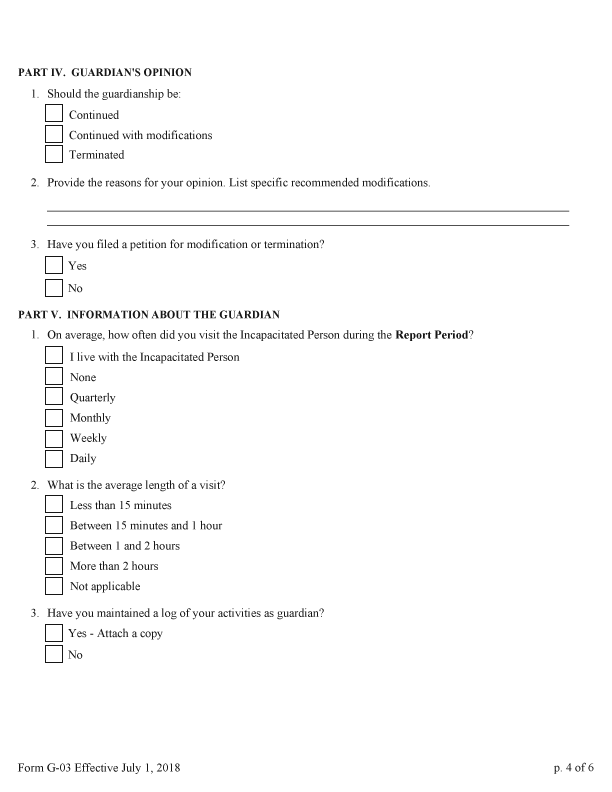
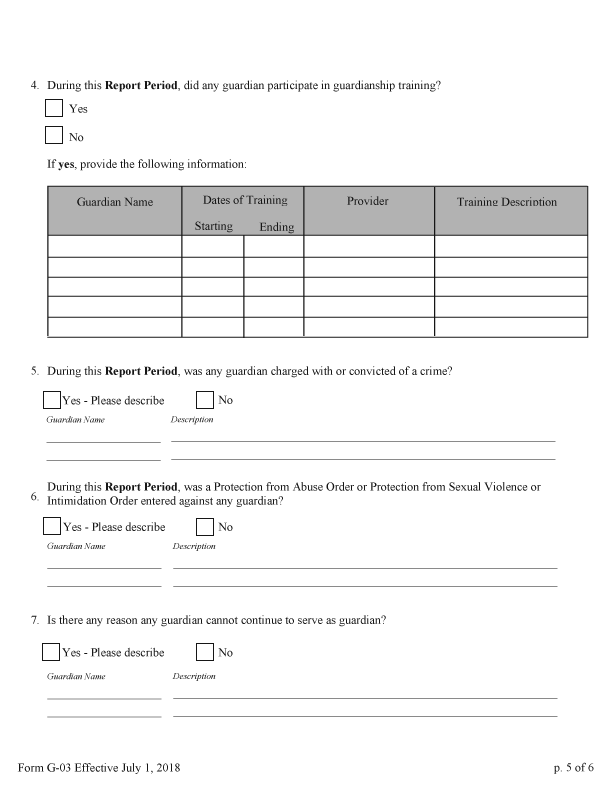
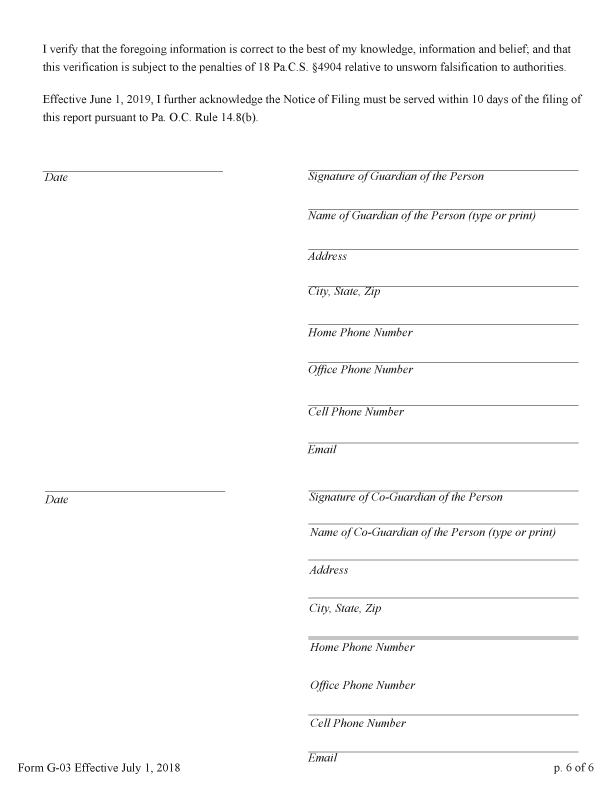
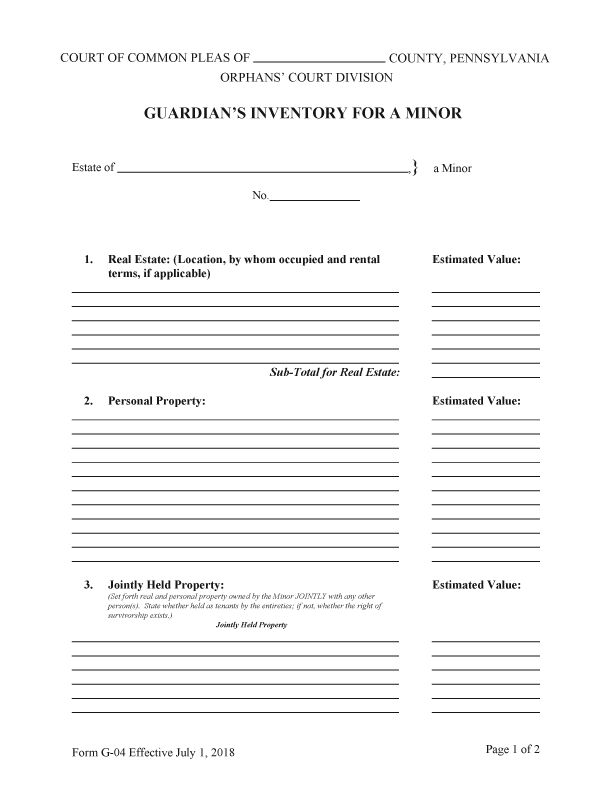
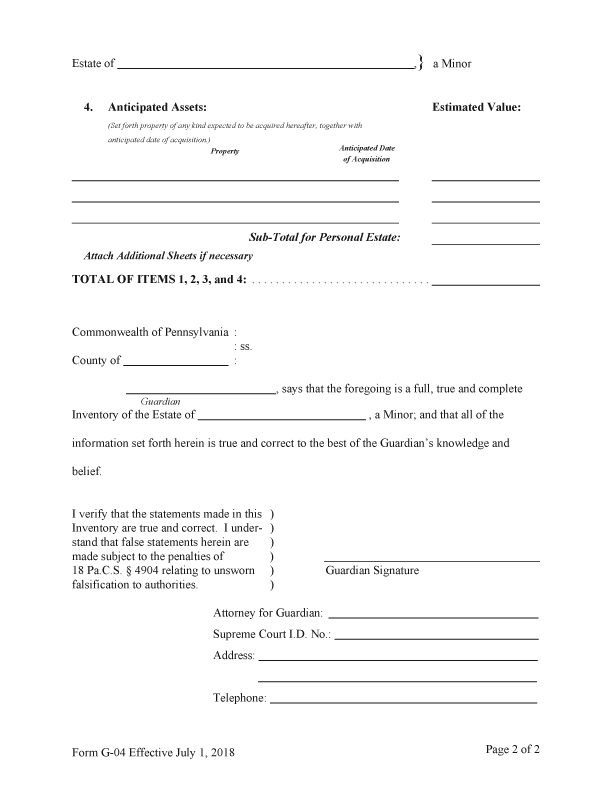
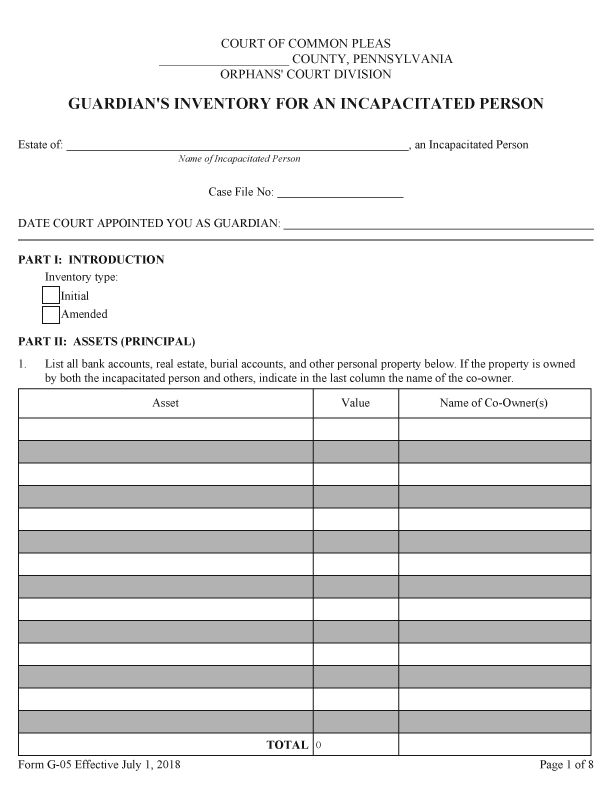
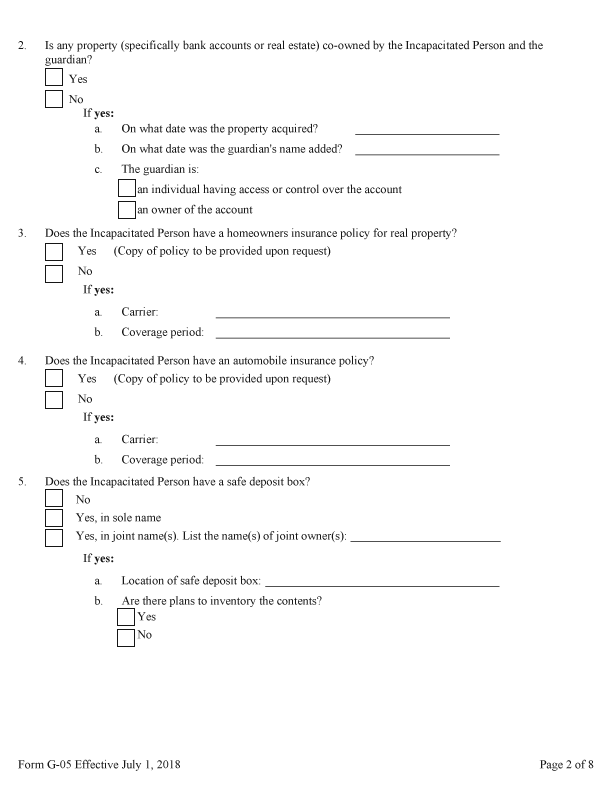
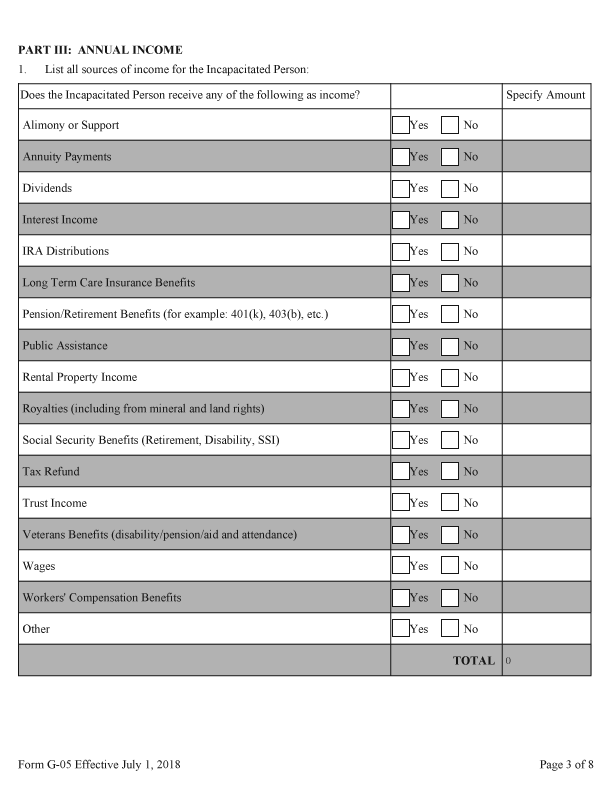
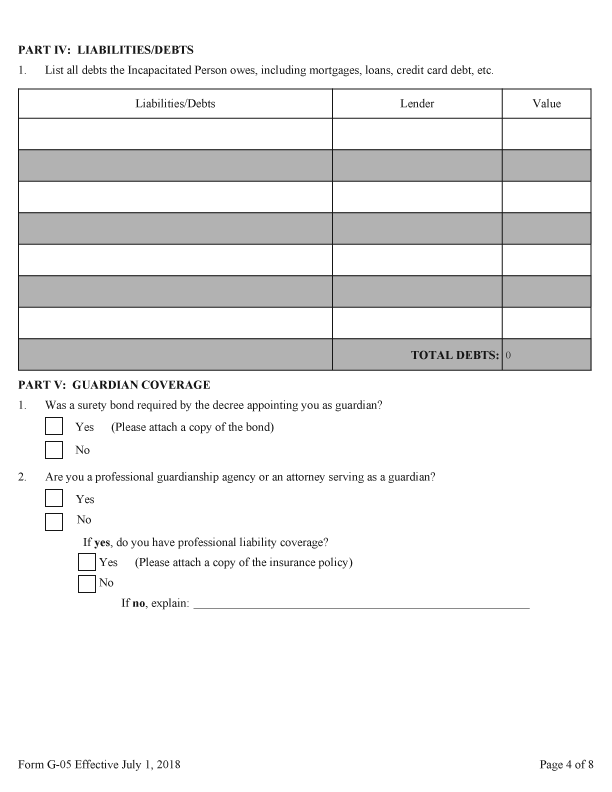
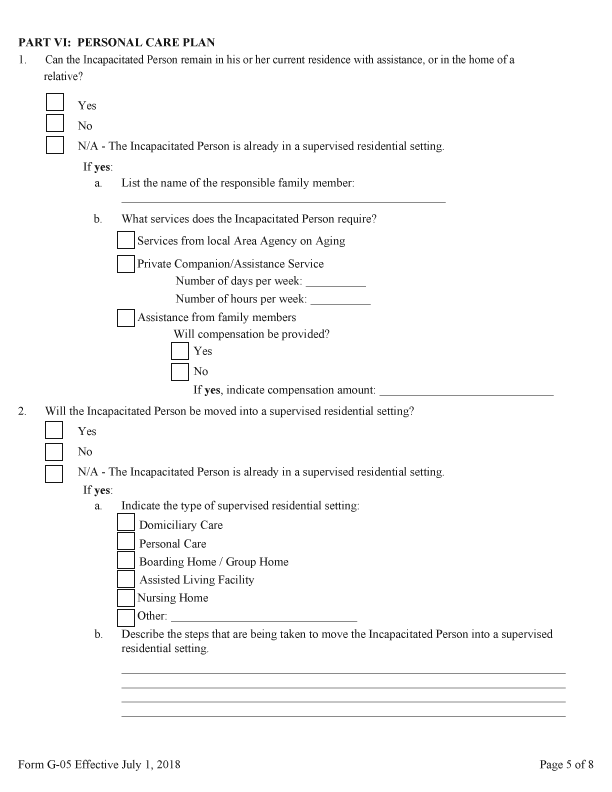
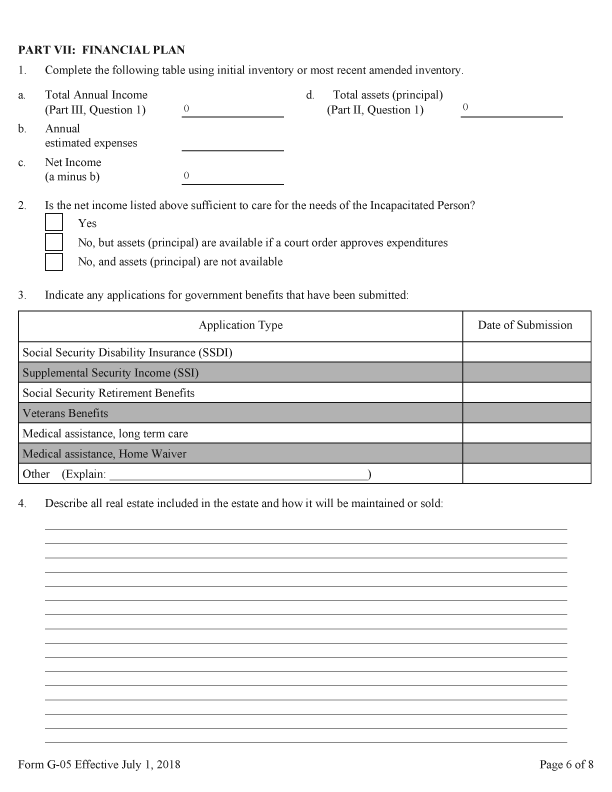
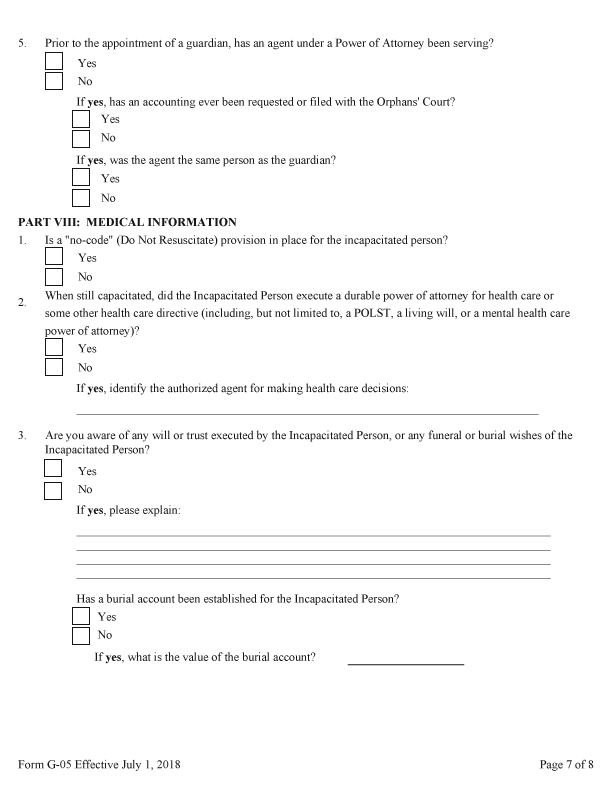
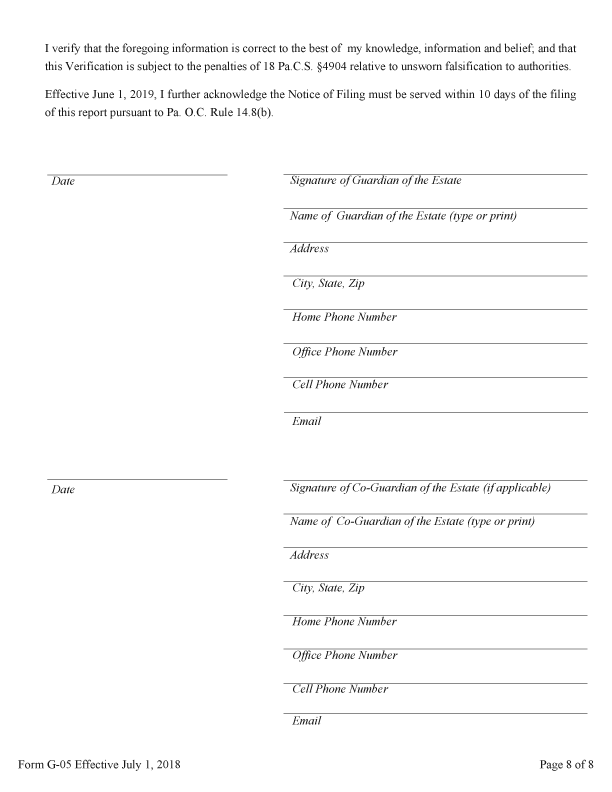
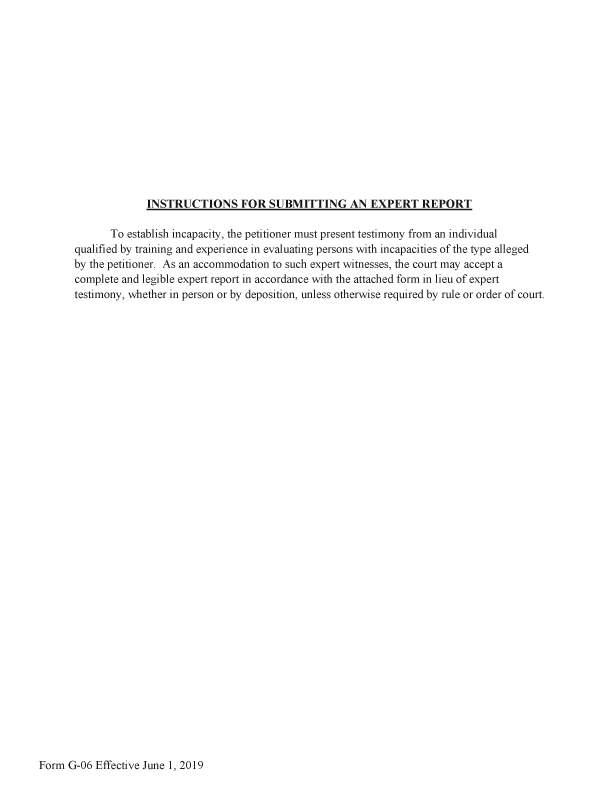
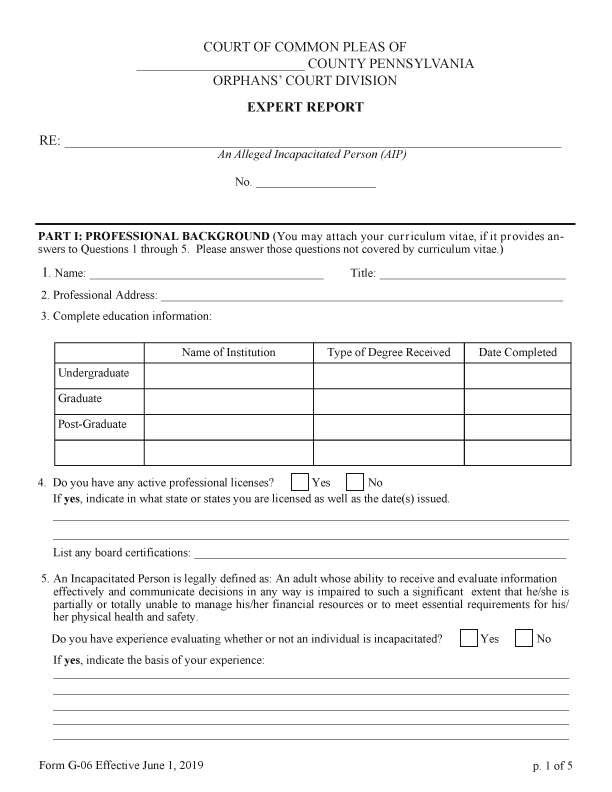

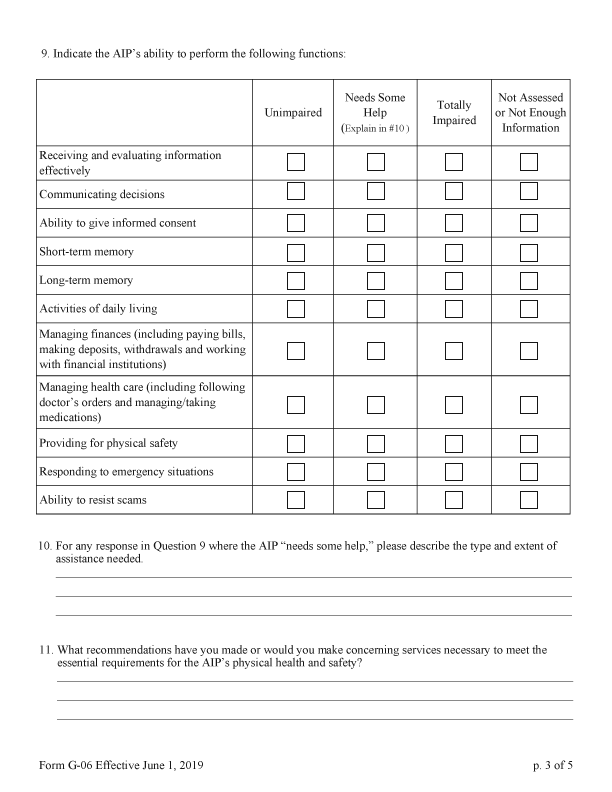
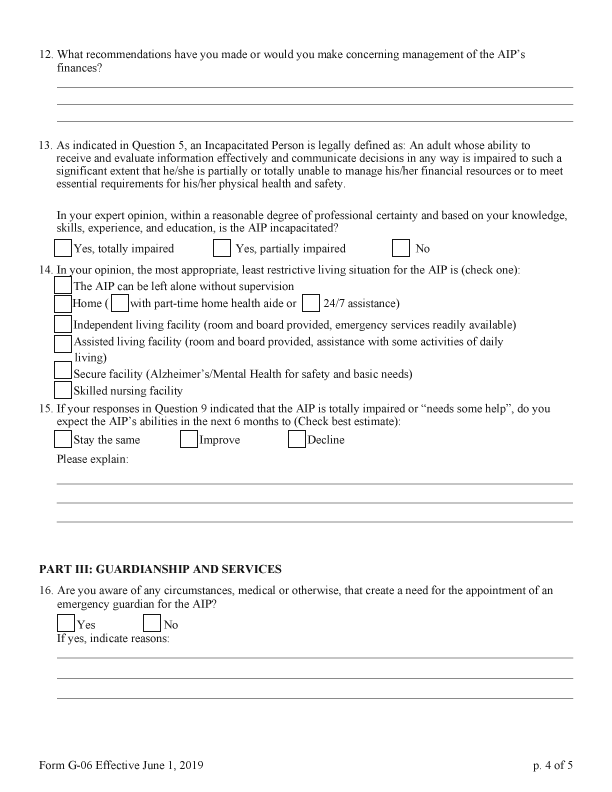
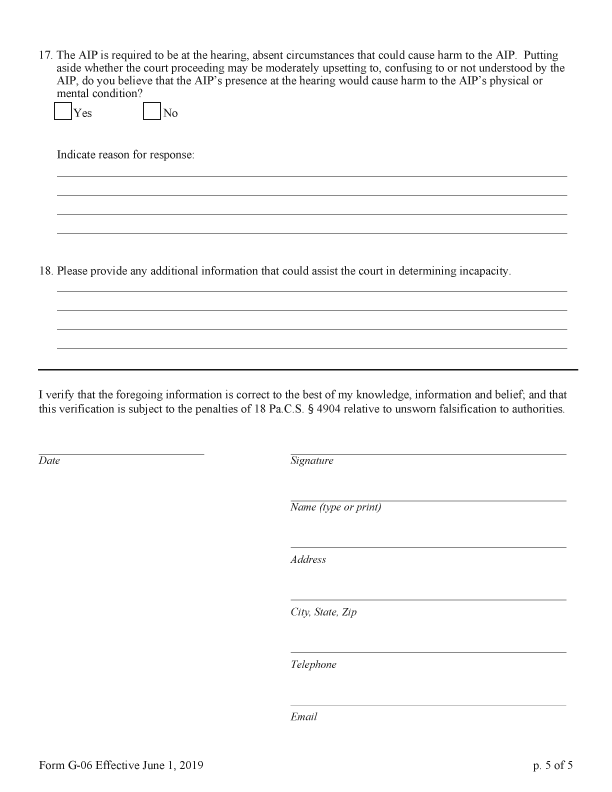
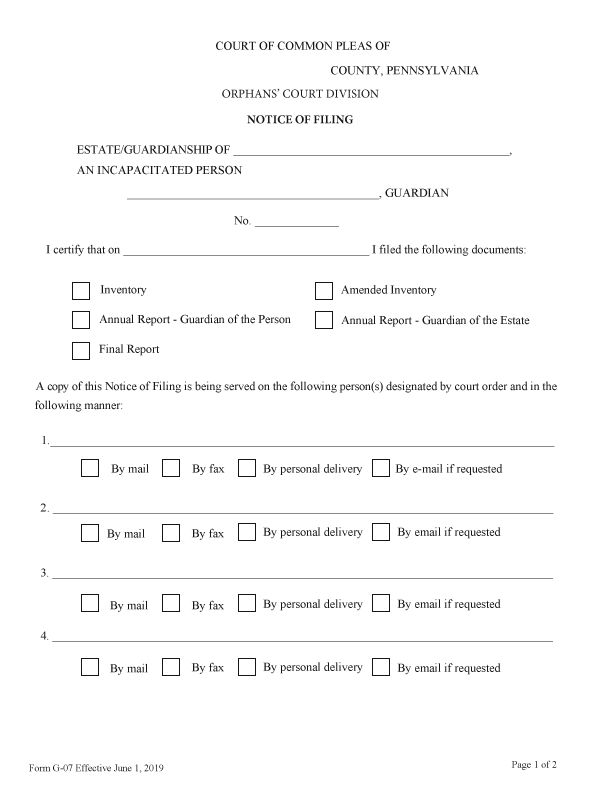
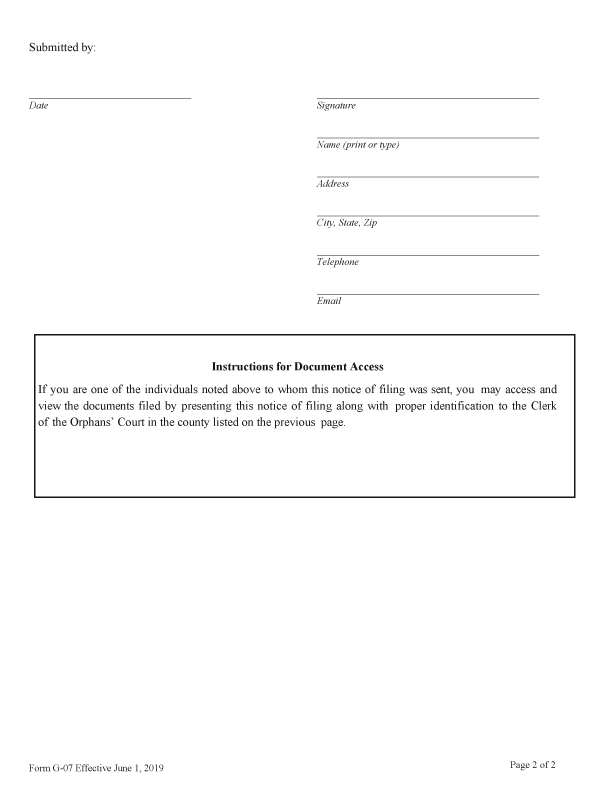
ORPHANS' COURT PROCEDURAL RULES COMMITTEE REPORT
Amendment of Pa. O.C. Rules 1.5 & 5.10—5.12; Rescission of Pa. O.C. Rules 14.1—14.5 and Orphans' Court Forms G-01 through G-04; Adoption of New Pa. O.C. Rules 14.1 through 14.14 and Orphans' Court Forms G-01—G-07; and Amendment of the Index to the Appendix On June 1, 2018, the Supreme Court of Pennsylvania adopted a comprehensive rewrite of the Pennsylvania Orphans' Court Rules related to guardianship proceedings pursuant to Title 20, Chapters 55 and 59. The rules were previously published for comment at 47 Pa.B. 5930 (September 23, 2017); 47 Pa.B. 4815 (August 19, 2017); and 46 Pa.B. 7934 (December 17, 2016).
Contained within this Report is the Orphans' Court Procedural Rules Committee's commentary related to the new rules. Please note that the Court does not adopt the Committee's commentary.
Rule 1.5 Local Rules
Through amendment of Rule 1.5 and operation of Order, No. 771 Supreme Court Rules Docket (June 1, 2018), all previously promulgated local rules concerning guardianship proceedings are vacated, effective June 1, 2019. For a local guardianship rule of procedure to be effective on June 1, 2019, it must be deemed necessary by the judicial district in light of the new statewide rules and be submitted to the Orphans' Court Procedural Rules Committee no later than December 1, 2018. This deadline is calculated to afford the Committee sufficient time to review the local rules, respond to the judicial district, and permit publication in the Pennsylvania Bulletin pursuant to Pa.R.J.A. No. 103(d). Submissions after December 1, 2018 will be accepted; however, the Committee may not be able to give late submissions sufficient priority to clear the review process before June 1, 2019. The effective date of the new local rules and new Chapter IV rules should coincide, i.e., June 1, 2019.
Rules 5.10-5.12 Transactions Related to Real Property
Cross-references to Rule 14.10 were added to the Notes when the transaction involves the real property of an incapacitated person.
Rule 14.1 Guardianship Petition Practice and Pleading
A number of comments inquired as to the extent that the requirements in Chapter III of the Pennsylvania Orphans' Court Rules concerning petition practice and pleading requirements would apply to guardianship proceedings. Rule 14.1 was crafted to place different requirements on petitions for the adjudication of incapacity and appointment of a guardian on one hand and all other petitions on the other hand. Paragraph (a) incorporated by reference and applied specific aspects of Chapter III to petitions for adjudication and appointment. Paragraph (b) provided for the filing of responsive pleadings in these proceedings, but does so on a limited basis and subject to a shorter time frame than Chapter III. While the Committee did not believe that such pleadings were going to be used frequently, a procedural mechanism should exist for contested guardianship proceedings.
It should be noted that responsive pleadings under paragraph (b) are permissive and not required—there are no ''default judgments'' with respect to the adjudication of incapacity. Further, the paragraph was not intended to preclude the judge from hearing objections first raised at the adjudicatory hearing. Finally, the judge was to decide the objections at the adjudicatory hearing rather than delaying that hearing with another to determine objections.
For all other petitions, paragraph (c) operates to apply the Chapter III requirements to those pleadings, subject to the modification of ''interested party.'' The Committee recognizes that Chapter III imposes more formal requirements on what were often informal proceedings. However, the provisions of Chapter III were designed to afford due process to all involved, and the Committee believes that petition practice in guardianship matters required no less protection. As observed in the Explanatory Comment, the requirements were not intended to preclude a petitioner from seeking relief on an emergency or expedited basis when circumstances warrant departure from strict adherence to the Chapter III requirements.
Paragraph (d) was intended to provide a procedure for a person to seek permission to intervene in a proceeding. This mechanism was crafted as recognition that those entitled to service pursuant to Rule 14.2(f) may not include all potentially aggrieved parties, e.g., business partner, fiancé, best friend.
Rule 14.2 Petition for Adjudication of Incapacity and Appointment of a Guardian of the Person or Estate of an Incapacitated Person
The required content of a petition set forth in the rule was intended to include those requisites set forth in 20 Pa.C.S. § 5511(c) as well as information to assist the court in determining capacity, the need for a guardian, the appointment of a guardian for the estate and/or the person, and the scope of a guardianship, as the case may be. An additional requirement was the identification of any person or persons who are to receive notice of the filing of reports.
Concerning persons who should be identified in and served with the petition, the Committee studied the interplay of Chapters 54, 55, 56, and 58 of Title 20. When a person has nominated a guardian in an instrument or there is a surrogate decision maker, it opens a number of residual issues. First, if a principal nominates a guardian pursuant to a power of attorney, a health care power of attorney, an advance health care directive (which is a combination of a living will and a health care power of attorney), a mental health care declaration, or mental health power of attorney, then the court must appoint that person as guardian except for good cause or disqualification. See 20 Pa.C.S. § 5604(c)(2) (power of attorney); 20 Pa.C.S. § 5460(b) (health care power of attorney); 20 Pa.C.S. § 5422 (defining ''advance health care directive''); 20 Pa.C.S. § 5823 (mental health declaration); 20 Pa.C.S. § 5841(c) (mental health power of attorney); see also Pa. O.C. Rule 14.6(b). Moreover, the court must determine the extent to which an agent's authority to act remains in effect under a power of attorney or a health care power of attorney. See 20 Pa.C.S. § 5604(c)(3); 20 Pa.C.S. § 5460(a); see also Pa. O.C. Rule 14.7(a)(1)(ii). Notably, if a principal who has executed a mental health power of attorney is later adjudicated an incapacitated person, the mental health power of attorney shall remain in effect. 20 Pa.C.S. § 5841(b)(1).
Second, in addition to the above-agents, there may be surrogate decision makers pursuant to a living will or by operation of law. See 20 Pa.C.S. § 5447 (a living will can contain a designation of a health care agent if the principal is incompetent and has an end-stage medical condition or is permanently unconscious); 20 Pa.C.S. § 5461 (a health care representative can make decisions for an incompetent person if the person does not have a health care power of attorney or a guardian has not been appointed for the person). These surrogate decision makers have an interest in the proceeding because the powers they currently exercise will be affected by a guardianship.
Therefore, the rules require that all these agents should be first identified in the petition pursuant to Rule 14.2(a)(6)—(a)(8). Rather than reference the myriad statutes by individual citation, the rule text references the applicable Chapter in Title 20. To the extent that writings exist related to the agent's authority, the writings are to be appended to the petition pursuant to Rule 14.2(c)(1). Further, these agents are to be served with the petition pursuant to Rule 14.2(f)(2)(iii).
Rule 14.2(a)(16) is intended to identify in the petition who should receive notice of the filing of the inventory and reports. This is a new statewide procedure. The court's order adjudicating incapacity and appointing a guardian is required to contain those entitled to receive notice of the filing of those reports. See Pa. O.C. Rule 14.7(a)(1)(iv). The notice of filing is required to be served on those entitled to receive notice after a report is filed. See Pa. O.C. Rule 14.8(b). The form of the notice of filing is set forth in Form G-07. A person entitled to receive the notice of filing may then access and view the report filed by presenting the notice to the clerk of the orphans' court.
Paragraph (b)(1) requires the petitioner to identify those individuals who will have direct responsibility for the alleged incapacitated person if the proposed guardian is an entity. This paragraph also requires the principal of the entity to be identified. Designating those persons having direct responsibility may be challenging at this stage in a guardianship proceeding, but doing so is necessary for the purpose of the criminal record check requirement. For those entities using a team approach or rotating assignments, identification of all likely individuals will be necessary.
Paragraph (b)(4) requires the petition to include whether the proposed guardian has completed any guardianship training. Paragraph (b)(5) requires disclosure of whether the proposed guardian is certified and any disciplinary history related to the certification. Paragraph (b)(6) requires the petitioner to include the current caseload for the guardian. Such information will assist the judge in the guardian selection process.
Rule 14.2(f)(2)(i) was revised post-publication to specifically limit service to only sui juris intestate heirs rather than both sui juris and non-sui juris heirs. This aligns the rule more closely with the statute. See 20 Pa.C.S. § 5511(a).
Rule 14.3 Alternative Proof of Incapacity: Expert Report in Lieu of In-Person or Deposition Testimony of Expert
In 2015, the Committee published for comment the Task Force's proposed form entitled ''Deposition by Written Interrogatories of Physician or Licensed Psychologist'' as part of a larger package of forms. See 45 Pa.B. 1070 (March 7, 2015). In 2016, the Committee published proposed new Rule 14.6 and a revised form for comment. See 46 Pa.B. 2306 (May 7, 2016). Retitled ''written deposition,'' the proposed form was intended to be completed by the evaluator and reflect the evaluator's assessment of the capacity of the alleged incapacitated person. See also 20 Pa.C.S. § 5518. After considering additional feedback, the Committee further refined the report and form, which were republished for comment. See 47 Pa.B. 5930 (September 23, 2017).
Rule 14.4 Counsel
This rule was crafted to establish the scope of counsel's services before commencement of the proceedings in order to avoid confusion about the role of counsel. While the rule requires private counsel to set forth information regarding fees in the engagement letter, the reasonableness of all fees incurred on behalf of the alleged incapacitated person, whether attributed to private counsel or appointed counsel, are subject to court review.
Paragraph (a) incorporates the statutory requirement that the petitioner inform the court seven days prior to the adjudicatory hearing whether the alleged incapacitated person has counsel. See 20 Pa.C.S. § 5511(a). Relatedly, the paragraph contains a requirement that the petitioner notify the court if the alleged incapacitated person requested counsel and one has not yet been retained.
Paragraphs (b)—(d) are intended to memorialize the scope of counsel's services before commencement of the proceedings in order to avoid confusion about the role of counsel. Paragraph (b) also requires private counsel to set forth information regarding fees in the engagement letter.
Rule 14.5 Waiver or Modification of Bond
This rule is not intended to encourage waiver or modification of bonds. Rather, it is intended to establish a procedure and standard for waiver and modification. Paragraph (b) permits the waiver or modification for good cause. Examples of ''good cause'' are contained in the Explanatory Comment. Paragraph (c) requires the court to consider the necessity and means of how ''good cause'' can be demonstrated in the future to provide assurance that ''good cause'' continues to exist.
Rule 14.6 Determination of Incapacity and Selection of Guardian
In paragraph (b), the Committee opted to incorporate by reference the statutory procedures for determining incapacity and appointing a guardian. Within 20 Pa.C.S. § 5511 there are other provisions that also could be replicated within the rules, such as closed hearings, jury trial, and the authority of the court to order an independent evaluation. Likewise, 20 Pa.C.S. § 5512.1 sets forth required findings to be made by the court regarding incapacity and the need for a guardianship. Yet, the Committee believed that the rules and Chapter 55 of Title 20 should be read in pari materia with each supplementing the other as to procedure. The Note to paragraph (a) contains reference to In re Peery, 727 A.2d 539 (Pa. 1999), as a reminder that a guardian is not required if the person, albeit lacking capacity, does not need guardianship services.
Rule 14.7 Order and Certificate
Rule 14.7 was created to set forth topics that all orders must address, see paragraph (a)(1), and language that all orders must contain, see paragraph (a)(2); 20 Pa.C.S. § 5512.1(h) (''At the conclusion of a proceeding in which the person has been adjudicated incapacitated, the court shall assure that the person is informed of his right to appeal and to petition to modify or terminate the guardianship.''). Regarding guardianships of the estate, paragraph (b)(1) requires orders to address bonding requirements and the authority of the guardian to spend principal without prior court approval. Paragraph (b)(2) requires all orders for guardian of the estate to contain language substantially in the form provided. The model language in paragraph (b)(2) is intended to address a recurring issue with financial institutions not readily permitting a guardian to have access to the incapacitated person's accounts or allowing the estate guardian to conduct transactions on behalf of the incapacitated person. Given that a financial institution may have branches in multiple counties, the Committee believed that similar model language should be used in every order to provide for consistent recognition and uniform effect.
Rule 14.8 Guardianship Reporting, Monitoring, Review, and Compliance
The requirement and timing of guardian reports and inventory required by statutes are reflected in Rule 14.8(a). See 20 Pa.C.S. §§ 5142, 5521(b), (c), 5921(f)(2). The forms to be used for reporting and inventory are set forth in the Appendix. Paragraph (a)(4) requires the filing of a final report when an order of limited duration has expired, which is intended to capture guardianships of finite duration pursuant to 20 Pa.C.S. § 5512.1(a)(5) (requiring the court to specify duration of guardianship), rather than emergency guardianships that terminate as a matter of statute pursuant to 20 Pa.C.S. § 5513.
When a guardian has filed a reporting form or inventory form with the clerk, Rule 14.8(b) requires the guardian to serve notice of the filing on all persons entitled to receive such notice, as identified in the court's order. The notice of filing (Form G-07) instructs the recipient that a copy of the notice along with proper identification will be required to access and view the filed documents.
The Committee considered a request to include a reference to the ''Guardianship Tracking System'' (GTS) in Rule 14.8. The GTS is an online system being developed by the Administrative Office of Pennsylvania Courts that will provide the means for guardians to file reports and update information online as opposed to the current paper process. The GTS is intended to standardize reporting, prevent mistakes, and ensure complete reports. It will store and carryover information from year-to-year, which is intended to facilitate the filing of subsequent reports. Further, the GTS can track information and flag accounts when inputted data falls outside of established parameters, which is intended to enhance guardianship monitoring. After the GTS is implemented on a statewide basis, then the rules will be amended to reflect to the availability of the system.
Rule 14.9 Review Hearing
Rule 14.9 permits the court to order a review hearing sua sponte or upon petition. When a review request is initiated by petition, the petitioner must comply with the requirements of paragraphs (b) and (c) relating to petition contents and service. Notice of the hearing, whether ordered sua sponte or prompted by petition, should be served on those who are or would be entitled to service of the guardianship petition.
Rule 14.10 Proceedings Relating to Real Property
Rule 14.10(a) is virtually identical to previous Pa. O.C. Rule 14.4. ''Real estate'' was replaced with ''real property'' to make the Rule consistent with Rules 5.10—5.12. Given the uniqueness, irreplaceability, and reliance that may be placed upon a sale, exchange, lease, or option of same, as well as a mortgage, of real property, paragraph (b) provides the means of bringing potential objections to the court's attention at the time of the petition.
Rule 14.11 Transfer of Guardianship of the Person to Another State
In 2012, the Uniform Adult Guardianship and Protective Proceedings Jurisdiction Act, 20 Pa.C.S. §§ 5901—5992, was enacted to govern the interstate judicial coordination of guardianships. Within the Act, Subchapter C provides for the transfer of guardianships from and to Pennsylvania. Rule 14.11 is intended to establish procedural rules implementing 20 Pa.C.S. § 5921 as it relates to guardianships of the person. Rule 14.12 is intended to establish similar rules for guardianships of the estate.
As indicated in the Explanatory Comment, a petition under Rule 14.11 relating to the guardianship of the person may also include a transfer request as provided in Rule 14.12 relating to the guardianship of the estate. This ability to present both matters in one petition was intended to eliminate the need to file multiple petitions. However, this ability will not relieve the petitioner of pleading all the necessary facts required of each specific petition.
Paragraph (a)(4) contains ''likely'' with the intention that likelihood may be established by evidence of the other state having procedures similar to Rule 14.13 (Acceptance of a Guardianship Transferred from Another State). Per the National Conference of Commissioners on Uniform State Laws' website, as of May 24, 2018, Florida, Texas, Michigan, and Kansas were the only states that had not enacted legislation based upon the Uniform Adult Guardianship and Protective Proceedings Jurisdiction Act.
Rule 14.12 Transfer of Guardianship of the Estate to Another State
See the Committee's remarks regarding Rule 14.11.
Rule 14.13 Acceptance of a Guardianship Transferred from Another State
Rule 14.13 is intended to provide a procedure for the transfer of a guardianship from another state to Pennsylvania. This rule is intended to implement 20 Pa.C.S. § 5922. Paragraph (a)(3) was added to require the petition and order determining the initial incapacity be attached. The Committee believed this was important information for the receiving court to possess. Further, this information might be helpful in determining whether a modification hearing may be necessary. Consistent with the reporting requirements applicable to guardianships commenced within Pennsylvania, a guardian of the transferred estate would be required to file an inventory within 90 days of the final order.
Rule 14.14 Forms
There are nine statewide forms associated with this Chapter, two of which (OC-03 and OC-04) are also associated with Pa. O.C. Rule 2.4 in Chapter II. Rule 14.14(f) and (g) are intended to incorporate those forms by reference. Likewise, Forms OC-03 and OC-04 are not replicated within the Appendix to Chapter XIV; rather, they are incorporated by reference. Those forms (OC-03 and OC-04), revised and re-promulgated on September 1, 2016, are not being revised, rescinded, or replaced by this recommendation.
The Citation with Notice form is largely the same content as the current form with now 14-point font to address the requirement of ''large type.'' See 20 Pa.C.S. § 5511(a). As with all forms, the ''footer date'' on the form will reflect the effective date as established by Supreme Court order.
The Report of Guardian of the Estate (G-02), the Report of Guardian of the Person (G-03), and the Guardian's Inventory for an Incapacitated Person (G-05) forms were previously published for comment at 45 Pa.B. 1070 (March 7, 2015). The forms were republished at 46 Pa.B. 7934 (December 17, 2016).
Presently, the ''inventory form'' is a dual use form—it is used for guardianships of incapacitated persons and for guardianships of minors, 20 Pa.C.S. § 5142 (requiring filing of an inventory for minors). The new ''inventory form'' was designed specifically for guardianships of incapacitated persons under Chapter 55 and the Guardianship Tracking System. To accommodate the continued use an ''inventory form'' for guardianships of minors under Chapter 51, current Form G-04 is retitled and revised to remove mention of incapacitated persons. Form G-05 will be the new ''inventory form'' for incapacitated persons.
The Notice of Filing (G-06) was published for comment at 45 Pa.B. 1070 (March 7, 2015) and 46 Pa.B. 7934 (December 17, 2016). The most significant change to the form, aside from formatting, was this re-designation from a ''certificate of filing'' to a ''notice of filing'' to make it consistent with the existing Pennsylvania Orphans' Court Rules.
The Expert Report (G-07) was republished for comment. See 47 Pa.B. 5930 (September 23, 2017).
These forms will be posted permanently on the UJS website with the other orphans' court forms. See http://www.pacourts.us/forms/for-the-public/orphans-court-forms. The index to the appendix containing the forms is amended to reflect the new forms.
Effective Dates
There are two effective dates for these amendments with each having a different critical path. The GTS will rely upon data required by the reporting forms (Report of Guardian of the Estate (G-02), Report of Guardian of the Person (G-03), and the Guardian's Inventory for an Incapacitated Person (G-05)) being entered by users. To facilitate implementation of the GTS, the reporting forms are effective July 1, 2018. Additionally, the Guardian's Inventory for a Minor (G-04) is amended to remove reference to ''incapacitated person.'' This amendment is also effective July 1, 2018.
The second effective date is the implementation of the rules and remaining forms (Citation with Notice (G-01), Notice of Filing (G-06), and Expert Report (G-07)), which have a longer critical pathway based largely on the submission and review of local rules. Accordingly, the effective date for the Rules and remaining forms is June 1, 2019.
[Pa.B. Doc. No. 18-914. Filed for public inspection June 15, 2018, 9:00 a.m.]
No part of the information on this site may be reproduced for profit or sold for profit.This material has been drawn directly from the official Pennsylvania Bulletin full text database. Due to the limitations of HTML or differences in display capabilities of different browsers, this version may differ slightly from the official printed version.